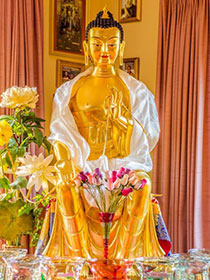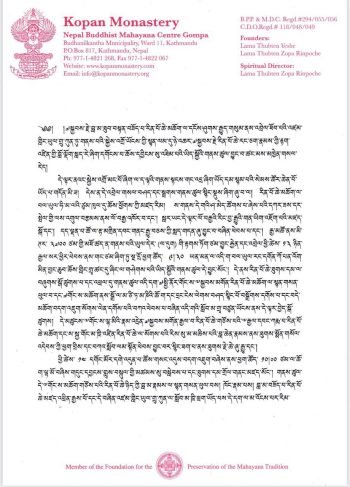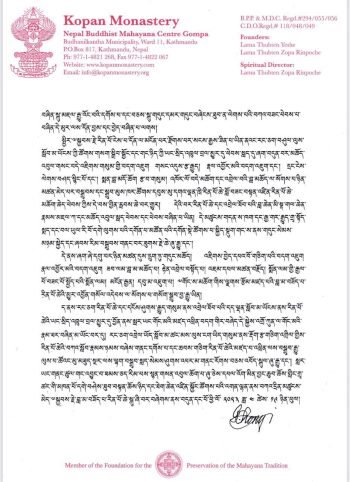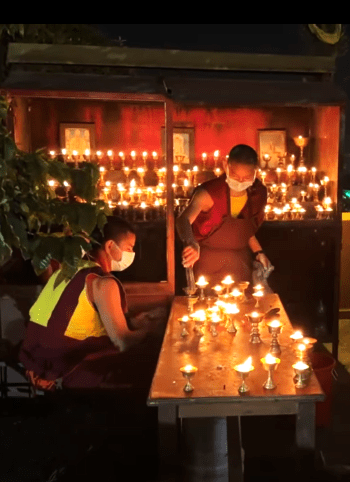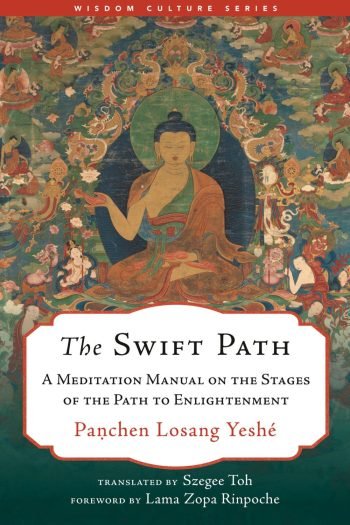- Home
- FPMT Homepage
Foundation for the Preservation of the Mahayana Tradition
The FPMT is an organization devoted to preserving and spreading Mahayana Buddhism worldwide by creating opportunities to listen, reflect, meditate, practice and actualize the unmistaken teachings of the Buddha and based on that experience spreading the Dharma to sentient beings. We provide integrated education through which people’s minds and hearts can be transformed into their highest potential for the benefit of others, inspired by an attitude of universal responsibility and service. We are committed to creating harmonious environments and helping all beings develop their full potential of infinite wisdom and compassion. Our organization is based on the Buddhist tradition of Lama Tsongkhapa of Tibet as taught to us by our founders Lama Thubten Yeshe and Lama Thubten Zopa Rinpoche.
- Willkommen
Die Stiftung zur Erhaltung der Mahayana Tradition (FPMT) ist eine Organisation, die sich weltweit für die Erhaltung und Verbreitung des Mahayana-Buddhismus einsetzt, indem sie Möglichkeiten schafft, den makellosen Lehren des Buddha zuzuhören, über sie zur reflektieren und zu meditieren und auf der Grundlage dieser Erfahrung das Dharma unter den Lebewesen zu verbreiten.
Wir bieten integrierte Schulungswege an, durch denen der Geist und das Herz der Menschen in ihr höchstes Potential verwandelt werden zum Wohl der anderen – inspiriert durch eine Haltung der universellen Verantwortung und dem Wunsch zu dienen. Wir haben uns verpflichtet, harmonische Umgebungen zu schaffen und allen Wesen zu helfen, ihr volles Potenzial unendlicher Weisheit und grenzenlosen Mitgefühls zu verwirklichen.
Unsere Organisation basiert auf der buddhistischen Tradition von Lama Tsongkhapa von Tibet, so wie sie uns von unseren Gründern Lama Thubten Yeshe und Lama Thubten Zopa Rinpoche gelehrt wird.
- Bienvenidos
La Fundación para la preservación de la tradición Mahayana (FPMT) es una organización que se dedica a preservar y difundir el budismo Mahayana en todo el mundo, creando oportunidades para escuchar, reflexionar, meditar, practicar y actualizar las enseñanzas inconfundibles de Buda y en base a esa experiencia difundir el Dharma a los seres.
Proporcionamos una educación integrada a través de la cual las mentes y los corazones de las personas se pueden transformar en su mayor potencial para el beneficio de los demás, inspirados por una actitud de responsabilidad y servicio universales. Estamos comprometidos a crear ambientes armoniosos y ayudar a todos los seres a desarrollar todo su potencial de infinita sabiduría y compasión.
Nuestra organización se basa en la tradición budista de Lama Tsongkhapa del Tíbet como nos lo enseñaron nuestros fundadores Lama Thubten Yeshe y Lama Zopa Rinpoche.
A continuación puede ver una lista de los centros y sus páginas web en su lengua preferida.
- Bienvenue
L’organisation de la FPMT a pour vocation la préservation et la diffusion du bouddhisme du mahayana dans le monde entier. Elle offre l’opportunité d’écouter, de réfléchir, de méditer, de pratiquer et de réaliser les enseignements excellents du Bouddha, pour ensuite transmettre le Dharma à tous les êtres. Nous proposons une formation intégrée grâce à laquelle le cœur et l’esprit de chacun peuvent accomplir leur potentiel le plus élevé pour le bien d’autrui, inspirés par le sens du service et une responsabilité universelle. Nous nous engageons à créer un environnement harmonieux et à aider tous les êtres à épanouir leur potentiel illimité de compassion et de sagesse. Notre organisation s’appuie sur la tradition guéloukpa de Lama Tsongkhapa du Tibet, telle qu’elle a été enseignée par nos fondateurs Lama Thoubtèn Yéshé et Lama Zopa Rinpoché.
Visitez le site de notre Editions Mahayana pour les traductions, conseils et nouvelles du Bureau international en français.
Voici une liste de centres et de leurs sites dans votre langue préférée
- Benvenuto
L’FPMT è un organizzazione il cui scopo è preservare e diffondere il Buddhismo Mahayana nel mondo, creando occasioni di ascolto, riflessione, meditazione e pratica dei perfetti insegnamenti del Buddha, al fine di attualizzare e diffondere il Dharma fra tutti gli esseri senzienti.
Offriamo un’educazione integrata, che può trasformare la mente e i cuori delle persone nel loro massimo potenziale, per il beneficio di tutti gli esseri, ispirati da un’attitudine di responsabilità universale e di servizio.
Il nostro obiettivo è quello di creare contesti armoniosi e aiutare tutti gli esseri a sviluppare in modo completo le proprie potenzialità di infinita saggezza e compassione.
La nostra organizzazione si basa sulla tradizione buddhista di Lama Tsongkhapa del Tibet, così come ci è stata insegnata dai nostri fondatori Lama Thubten Yeshe e Lama Zopa Rinpoche.
Di seguito potete trovare un elenco dei centri e dei loro siti nella lingua da voi prescelta.
- 欢迎 / 歡迎
简体中文
“护持大乘法脉基金会”( 英文简称:FPMT。全名:Foundation for the Preservation of the Mahayana Tradition) 是一个致力于护持和弘扬大乘佛法的国际佛教组织。我们提供听闻,思维,禅修,修行和实证佛陀无误教法的机会,以便让一切众生都能够享受佛法的指引和滋润。
我们全力创造和谐融洽的环境, 为人们提供解行并重的完整佛法教育,以便启发内在的环宇悲心及责任心,并开发内心所蕴藏的巨大潜能 — 无限的智慧与悲心 — 以便利益和服务一切有情。
FPMT的创办人是图腾耶喜喇嘛和喇嘛梭巴仁波切。我们所修习的是由两位上师所教导的,西藏喀巴大师的佛法传承。
繁體中文
護持大乘法脈基金會”( 英文簡稱:FPMT。全名:Found
ation for the Preservation of the Mahayana Tradition ) 是一個致力於護持和弘揚大乘佛法的國際佛教組織。我們提供聽聞, 思維,禪修,修行和實證佛陀無誤教法的機會,以便讓一切眾生都能 夠享受佛法的指引和滋潤。 我們全力創造和諧融洽的環境,
為人們提供解行並重的完整佛法教育,以便啟發內在的環宇悲心及責 任心,並開發內心所蘊藏的巨大潛能 — 無限的智慧與悲心 – – 以便利益和服務一切有情。 FPMT的創辦人是圖騰耶喜喇嘛和喇嘛梭巴仁波切。
我們所修習的是由兩位上師所教導的,西藏喀巴大師的佛法傳承。 察看道场信息:
- FPMT Homepage
- News/Media
-
- Study & Practice
-
-
- About FPMT Education Services
- Latest News
- Programs
- New to Buddhism?
- Buddhist Mind Science: Activating Your Potential
- Heart Advice for Death and Dying
- Discovering Buddhism
- Living in the Path
- Exploring Buddhism
- FPMT Basic Program
- FPMT Masters Program
- FPMT In-Depth Meditation Training
- Maitripa College
- Lotsawa Rinchen Zangpo Translator Program
- Universal Education for Compassion & Wisdom
- Online Learning Center
-
- Prayers & Practice Materials
- Overview of Prayers & Practices
- Full Catalogue of Prayers & Practice Materials
- Explore Popular Topics
- Benefiting Animals
- Chenrezig Resources
- Death & Dying Resources
- Lama Chopa (Guru Puja)
- Lama Zopa Rinpoche: Compendium of Precious Instructions
- Lama Zopa Rinpoche: Life Practice Advice
- Lama Zopa Rinpoche Practice Series
- Lamrim Resources
- Mantras
- Prayer Book Updates
- Purification Practices
- Sutras
- Thought Transformation (Lojong)
- Audio Materials
- Dharma Dates - Tibetan Calendar
- Translation Services
- Publishing Services
- Ways to Offer Support
- Prayers & Practice Materials
-
- Teachings and Advice
- Find Teachings and Advice
- Lama Zopa Rinpoche Advice Page
- Lama Zopa Rinpoche: Compendium of Precious Instructions
- Lama Zopa Rinpoche Video Teachings
- ༧སྐྱབས་རྗེ་བཟོད་པ་རིན་པོ་ཆེ་མཆོག་ནས་སྩལ་བའི་བཀའ་སློབ་བརྙན་འཕྲིན།
- Podcasts
- Lama Yeshe Wisdom Archive
- Buddhism FAQ
- Dharma for Young People
- Resources on Holy Objects
- Teachings and Advice
-
-
*If a menu item has a submenu clicking once will expand the menu clicking twice will open the page.
-
-
- Centers
-
- Teachers
-
- Projects
-
-
-
-
*If a menu item has a submenu clicking once will expand the menu clicking twice will open the page.
-
-
- FPMT
-
-
-
-
-
Whatever problem one experiences if one thinks about the benefits of problems and how they are beneficial for ones own life, to develop ones mind in compassion, to develop loving kindness, patience, wisdom, and all the positive qualities for the path to liberation. By thinking of the benefits one develops this precious quality, this most healthy positive way of thinking that brings happiness and that stops you from harming yourself and stops you from harming others.
Lama Zopa Rinpoche
-
-
-
- Shop
-
-
-
The Foundation Store is FPMT’s online shop and features a vast selection of Buddhist study and practice materials written or recommended by our lineage gurus. These items include homestudy programs, prayers and practices in PDF or eBook format, materials for children, and other resources to support practitioners.
Items displayed in the shop are made available for Dharma practice and educational purposes, and never for the purpose of profiting from their sale. Please read FPMT Foundation Store Policy Regarding Dharma Items for more information.
-
-
Lama Zopa Rinpoche News and Advice
17
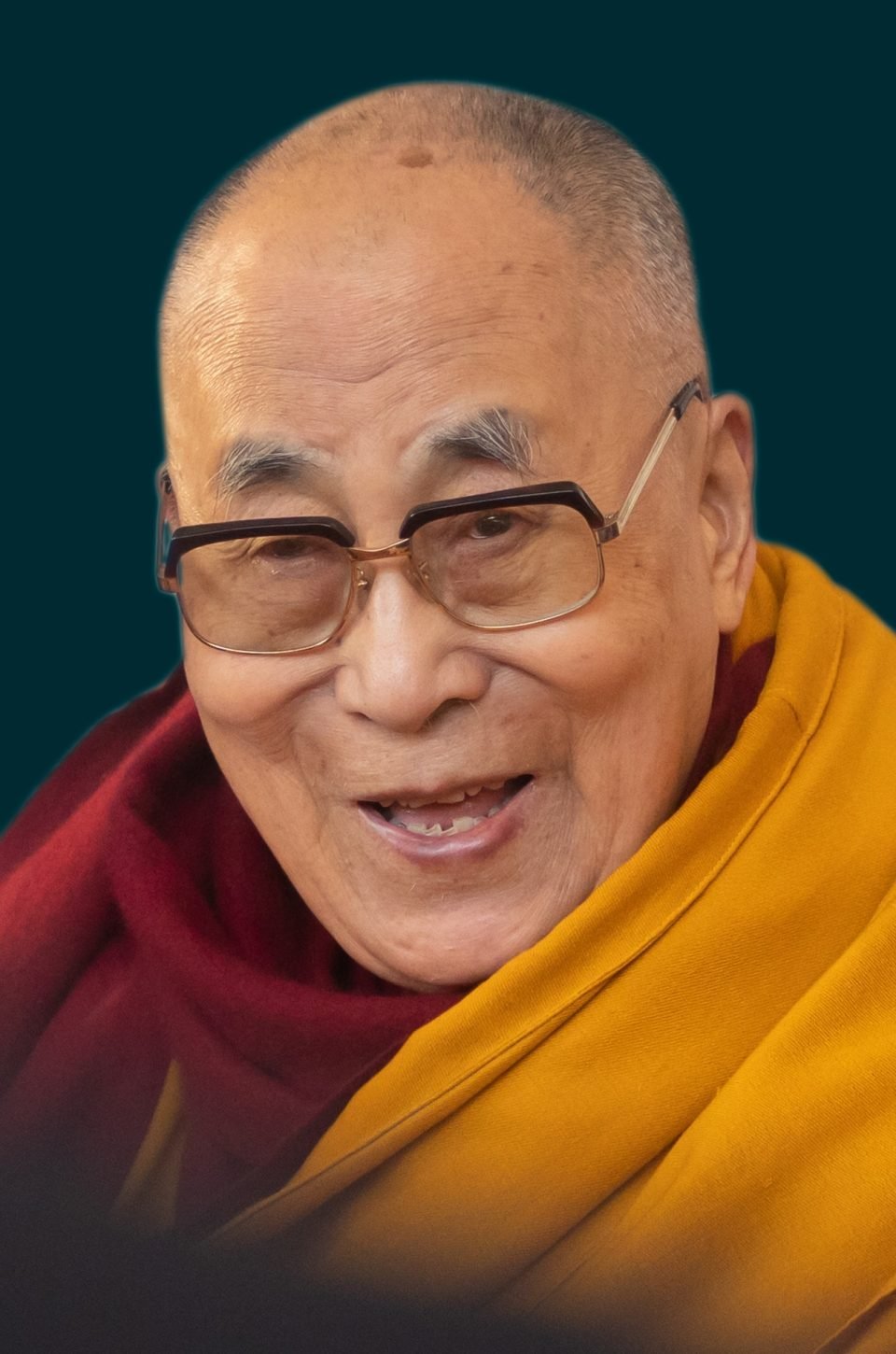
His Holiness the Dalai Lama on the occasion the laying of the foundation stone for The Dalai Lama Centre for Tibet and Indian Ancient Wisdom on the Maitreya land in Bodhgaya, India. Photo by Ven. Lobsang Sherab.
On May 24, 2023, FPMT has the incredibly precious opportunity to offer a long life puja to His Holiness the Dalai Lama at Namgyal
Monastery, Mcleod Ganj, India. All are welcome to attend in person or also join online: www.dalailama.com/live
Live webcasts will be available in Tibetan, Chinese, Vietnamese, Russian, German, Mongolian, Hindi, Japanese, Korean, Italian, French and Spanish.
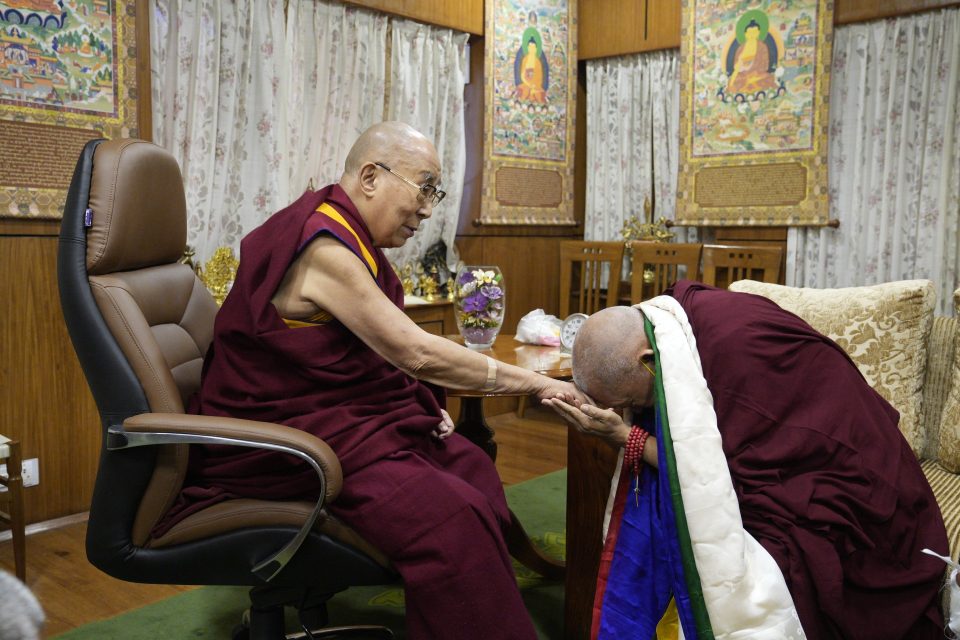
His Holiness meeting with Lama Zopa Rinpoche, Dharamsala, India, November 2, 2022. Photo courtesy of the Office of His Holiness the Dalai Lama.
We are very happy to share with you the text that will be used in this long life puja for His Holiness. All are welcome to download this text and follow along during the event.
The 1,000 statues of Shakyamuni Buddha which will be offered to His Holiness are well underway being created, as well as the two life-sized Namgyalma and Padmasambhava statues. These statues are being filled, gold gilded, and the faces are being painted in preparation for the offering. During the actual puja we will have more than 400 of the 1,000 statues to offer, and the remaining statues will be offered to His Holiness as soon as they are completed.
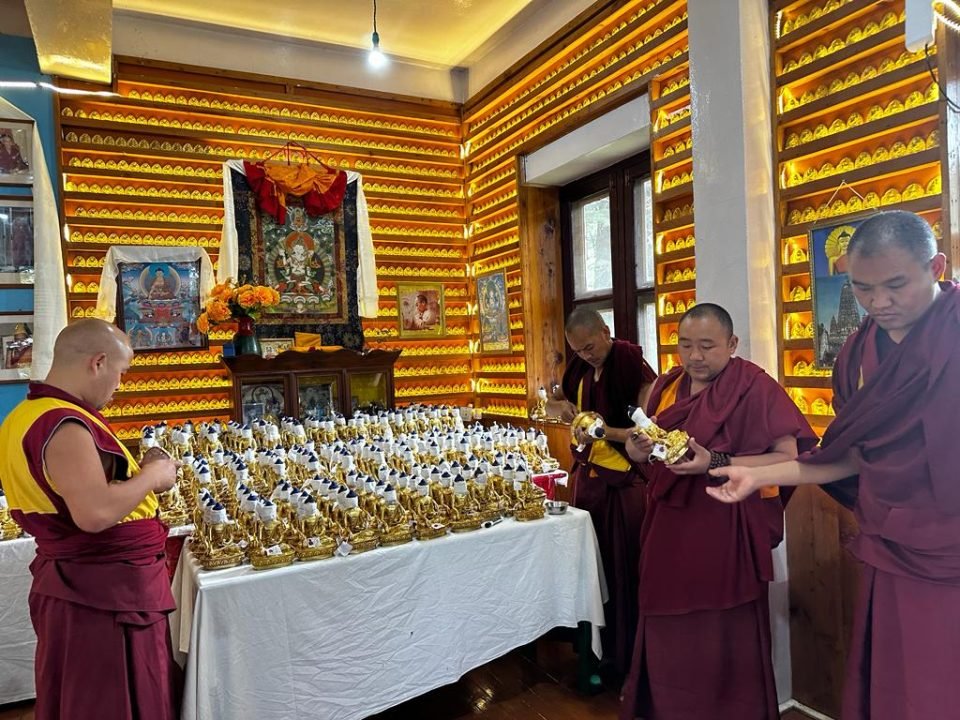
Kopan monks filling 400 of the 1,000 statues which will be offered to HIs Holiness the Dalai Lama during the long life puja on May 24, 2023.
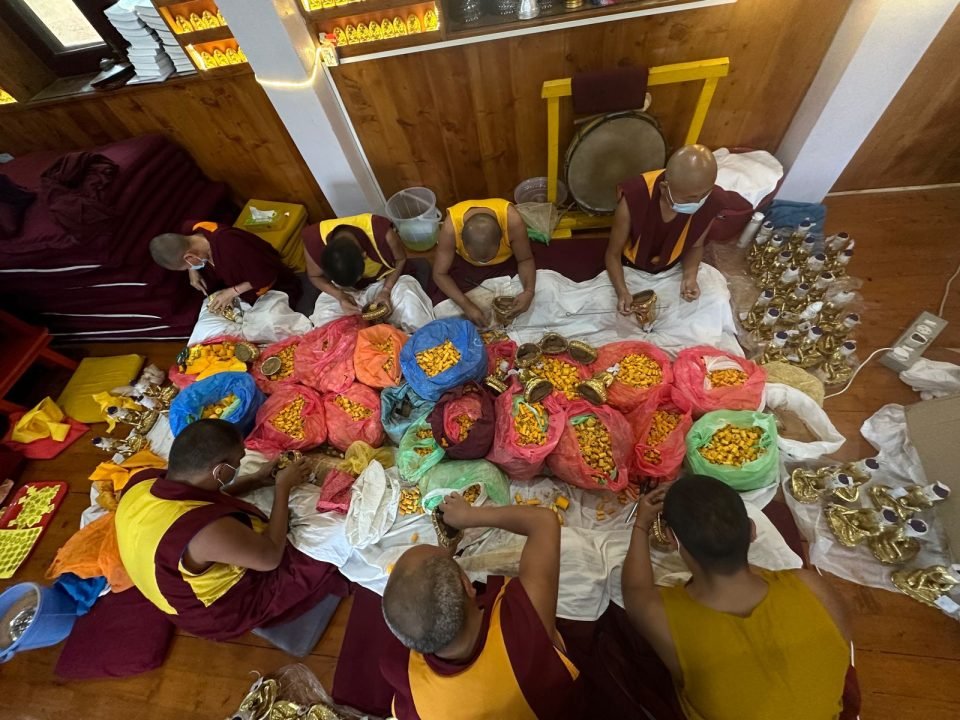
Kopan monks filling 400 of the 1,000 statues which will be offered to HIs Holiness the Dalai Lama during the long life puja on May 24, 2023.
We very much hope that everyone can attend this heartfelt long life puja offered to His Holiness the Dalai Lama, in person or online, and participate in this precious offering.
You can follow important news about His Holiness the Dalai Lama on the official website of His Holiness:
https://www.dalailama.com/news
9
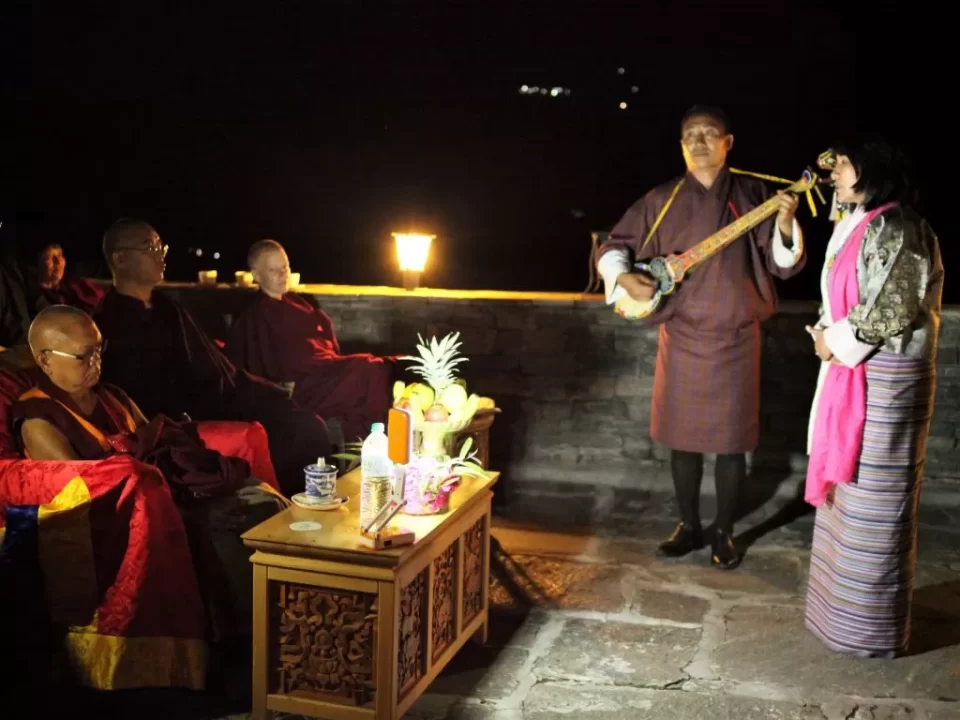
Singer Lhamo Dukpa offering a song to Lama Zopa Rinpoche, Bhutan, June 2016. Photo by Ven. Losang Sherab.
We are happy to share these beautiful tunes in Tibetan of two swift return prayers for Lama Zopa Rinpoche by the Bhutanese artist Lhamo Dukpa. These versions are for the inspiration of students.
Lama Zopa Rinpoche met singer Lhamo Dukpa in Bhutan in 2016. When she heard of Rinpoche’s passing, she offered beautiful tunes of the swift return prayers composed by His Holiness the Dalai Lama and Rangjung Neljorma Khandro Tseringma.
Ven. Roger Kunsang was moved by this offering and requested her to record it professionally in a studio, which was kindly sponsored in Bhutan.
We invite you to listen to these audio recordings here, or by downloading them to listen to whenever one wishes.
This audio features the tunes in Tibetan-language of A Prayer for the Swift Return of Lama Zopa Rinpoche composed by His Holiness the 14th Dalai Lama, Tenzin Gyatso:
This audio features the tunes in Tibetan-language of A Lamenting Wail, A Supplication for the Swift Return of the Supreme Lord of Refuge, Lama Zopa Rinpoche by Rangjung Neljorma Khandro Tseringma (p.12):
These tunes are also available as free downloadable MP3s:
- A Prayer for the Swift Return of Lama Zopa Rinpoche by His Holiness the 14th Dalai Lama, Tenzin Gyatso – MP3 Download
- A Lamenting Wail, A Supplication for the Swift Return of the Supreme Lord of Refuge, Lama Zopa Rinpoche by Ranjung Neljorma Khandro Tseringma – MP3 Download
Prayers for the Swift Return of Lama Zopa Rinpoche are available for download in several languages: https://fpmt.org/teachers/zopa/updates-regarding-rinpoche/#swiftreturn
You can watch a video of Lhamo Dukpa recording and singing A Prayer for the Swift Return of Lama Zopa Rinpoche by His Holiness the 14th Dalai Lama.
- Tagged: lhamo dukpa, swift return prayers
28
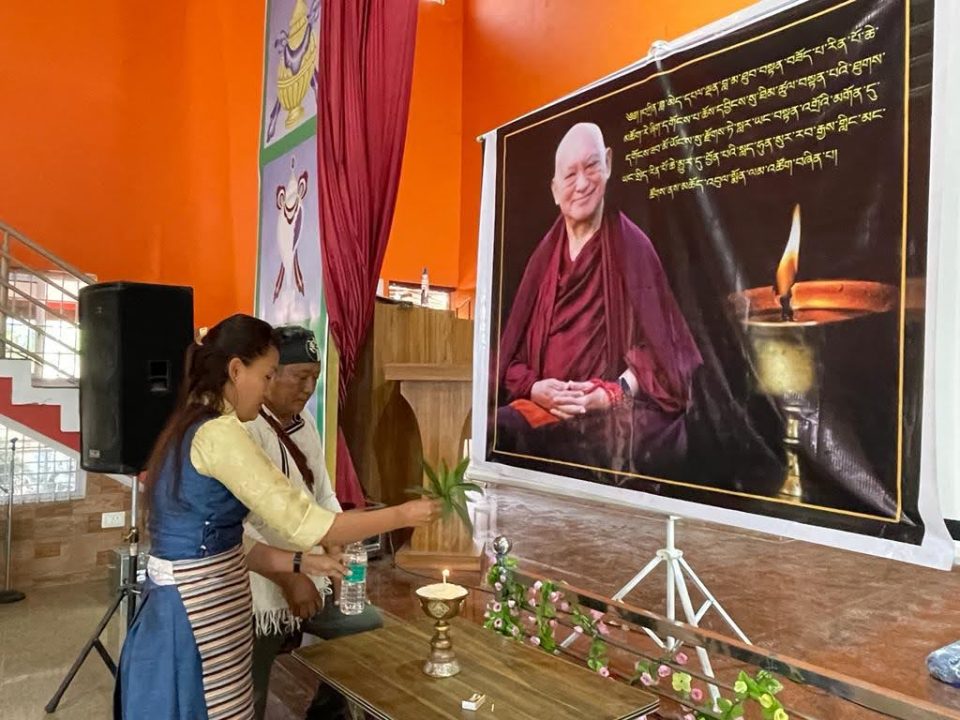
Members of the Rabgayling Tibetan settlement offering a butter lamp. Hunsur, south India, April 14, 2023. Photo by Rabgayling Tibetan Settlement Office.
We are happy to share two new photo galleries to visually document some of the prayers and pujas being offered for the swift return of Lama Zopa Rinpoche.
One gallery is photos from Kopan Monastery and Nunnery, including photos from the Kopan group doing prayers in Swayambhunath; the other gallery includes photos from other monasteries and communities in India and Nepal.
We will add to these galleries frequently, so check back often for inspiration and rejoicing.
Prayers for the Swift Return of Lama Zopa Rinpoche – Kopan Monastery & Swayambhunath Stupa:
https://fpmt.org/teachers/zopa/updates-regarding-rinpoche/tributes-and-condolences/prayers-for-the-swift-return-of-lama-zopa-rinpoche-kopan/
Prayers for the Swift Return of Lama Zopa Rinpoche (India, Nepal, and other communities):
https://fpmt.org/teachers/zopa/updates-regarding-rinpoche/tributes-and-condolences/prayers-for-the-swift-return-of-lama-zopa-rinpoche-other-monasteries/
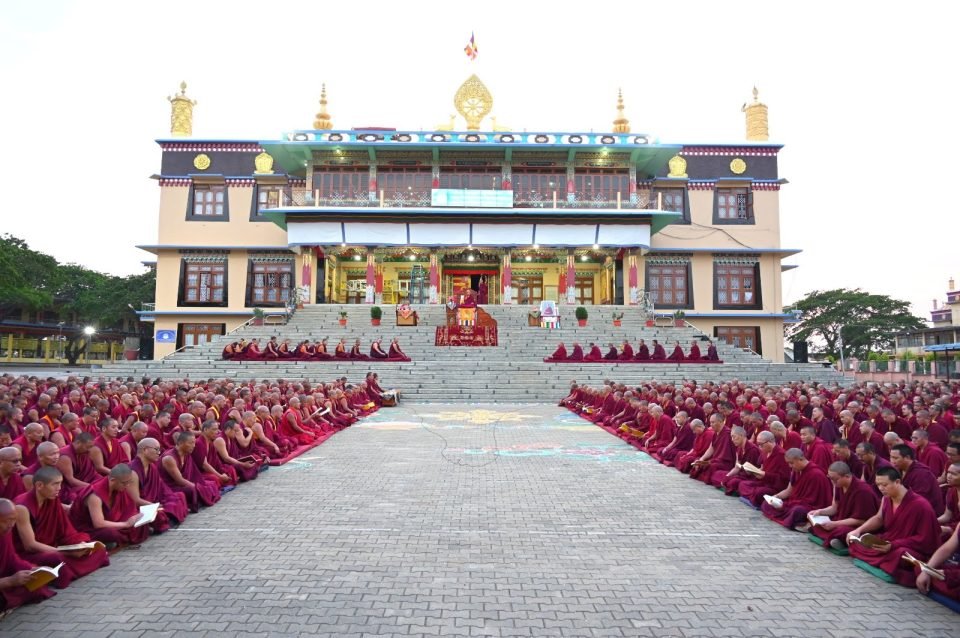
His Eminence Ganden Tri Rinpoche presiding the prayers by the Sera Jey Sangha, April 13, 2023. Photo by Sera Jey Monastery.
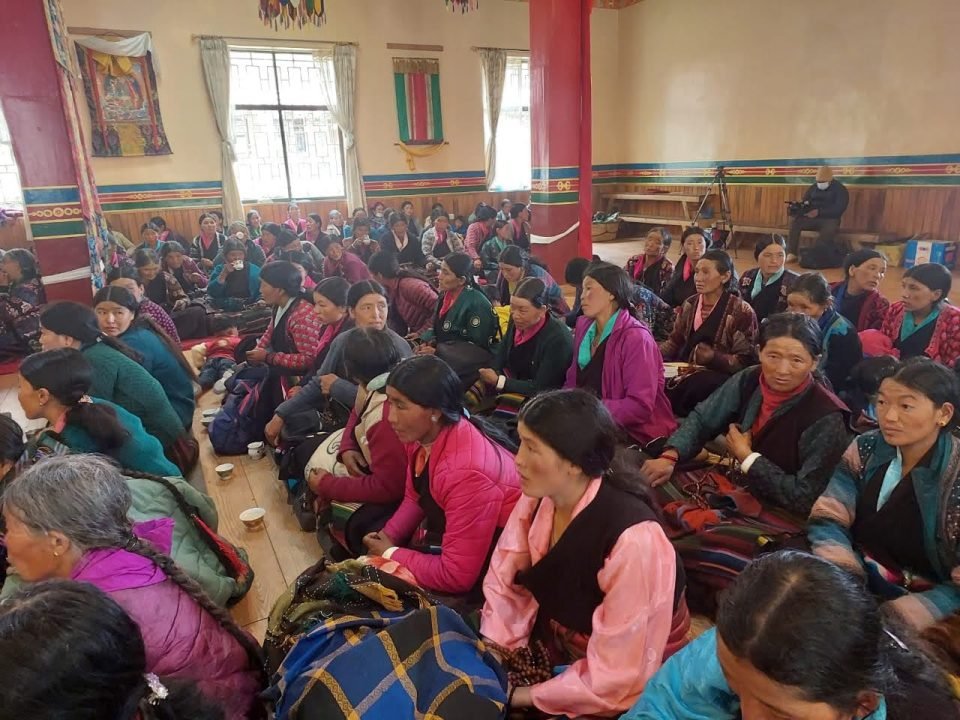
Lay people doing daily prayers at Rachen Nunnery, Tsum, Nepal.
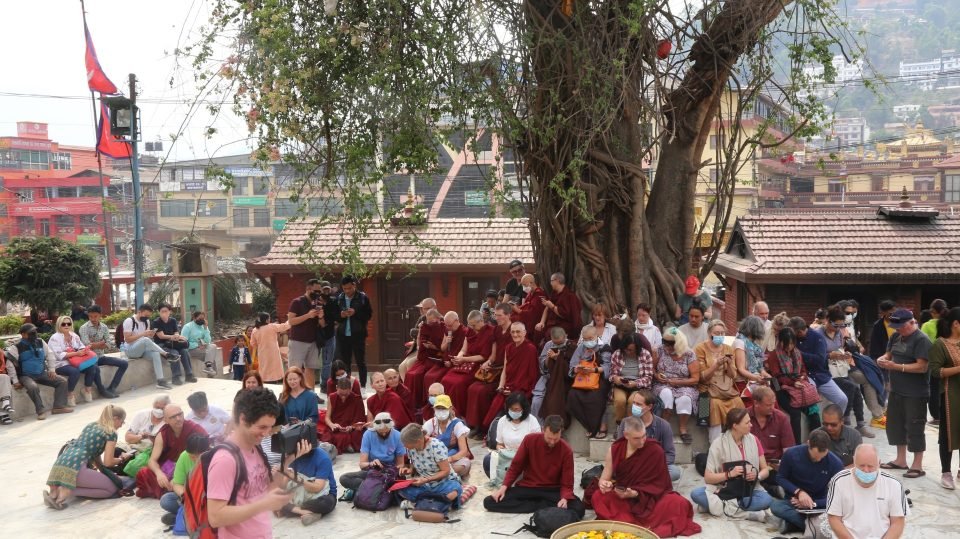
Sangha and lay students on pilgrimage from Kopan Monastery to Swayambhu, Nepal, April 23, 2023, to offer prayers for the swift return of Lama Zopa Rinpoche.
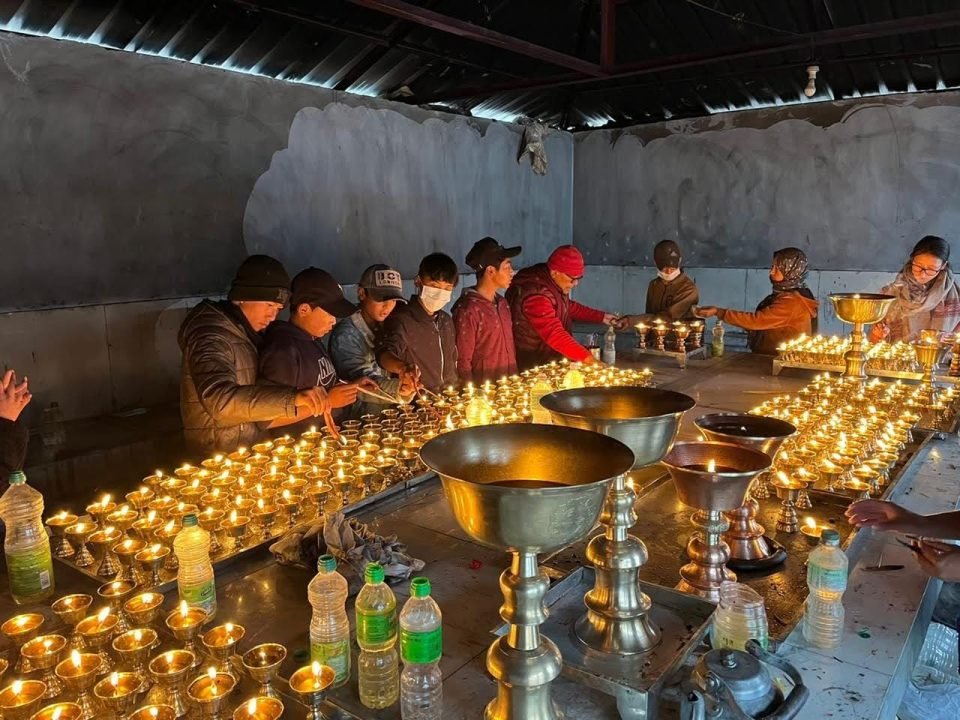
Lay people doing daily prayers at Rachen Nunnery, Tsum, Nepal.
As a reminder, we also have created a page dedicated to the tributes and condolences we continue to receive from great lamas, friends, and monastery officials around the world.
We also have resources for those wishing to offer their own prayers for the swift return of Lama Zopa Rinpoche, including A Prayer for the Swift Return of Lama Zopa Rinpoche, composed by His Holiness the Dalai Lama, currently available in seven languages.
We will continue to send out updates as they become available, and these will be collected on this updates page.
Foundation for the Preservation of Mahayana Tradition (FPMT), is a Tibetan Buddhist organization dedicated to the transmission of the Mahayana Buddhist tradition and values worldwide through teaching, meditation and community service.
- Tagged: kopan monastery, kopan nunnery, lama zopa rinpoche updates, photo gallery, swift return prayers
27
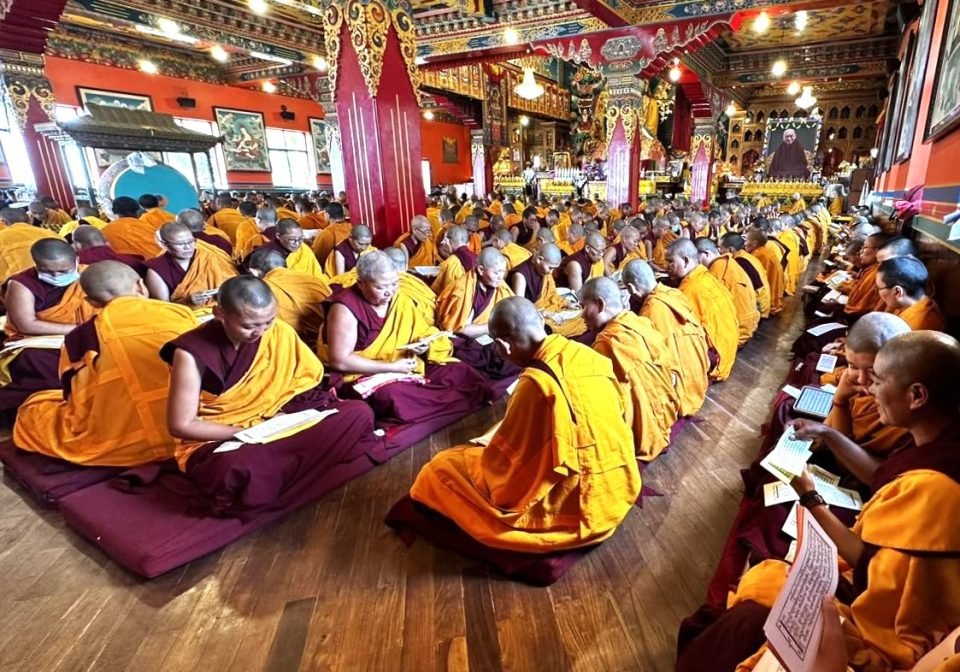
Kopan monks, nuns and students offering Heruka Lama Chopa with Tsog on the fourteenth day of Lama Zopa Rinpoche’s passing. Photo courtesy of Kopan Monastery FB page.
Today we share some essential updates and reminders about important upcoming events.
Long Life Puja for His Holiness the Dalai Lama
The long life puja being offered to His Holiness the Dalai Lama on May 24 in India continues to be a major event for us all, as it is the fulfilment of one of Lama Zopa Rinpoche’s holy wishes. We hope that many will be able to participate in this extremely auspicious event in person or via livestream. We will bring you information regarding the livestream details soon.
49th Day after the Passing of Lama Zopa Rinpoche
On May 31, Heruka Lama Chopa with Tsog will be offered at Kopan Monastery on the occasion of the 49th day since Lama Zopa Rinpoche’s passing. All are welcome to join the livestream of this special puja. As a reminder, this livestream of the prayers and pujas happening continuously for Lama Zopa Rinpoche’s swift return is available for all to join: https://www.youtube.com/c/fpmtinc/live
Light of the Path Retreat and Foundation Service Seminar
Due to practical considerations, Kopan Monastery will host the Light of the Path Retreat for the dates and length originally planned which are: September 3 – 17, 2023. Kopan will soon put out an update on this retreat which we will share as it is available. We are happy to share that the Foundation Service Seminar scheduled at Kopan following the retreat will also occur on the dates originally planned: September 21 – 26.
We will continue to send out updates as they become available, and these will be collected on this updates page.
Foundation for the Preservation of Mahayana Tradition (FPMT), is a Tibetan Buddhist organization dedicated to the transmission of the Mahayana Buddhist tradition and values worldwide through teaching, meditation and community service.
- Tagged: foundation service seminar, his holiness the dalai lama, his holiness the dalai lama long life puja, kopan monastery, light of the path retreat
20
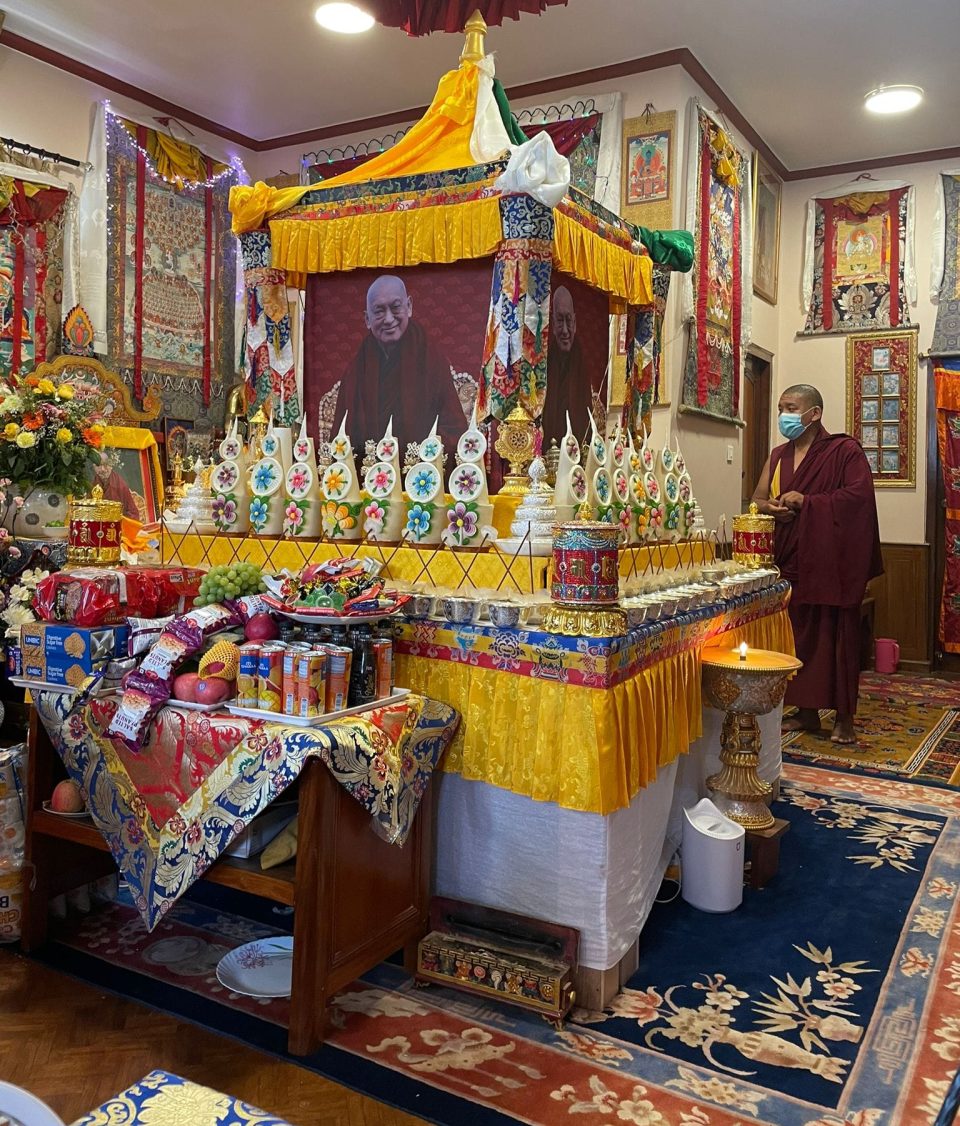
Prayers continue 24 hours a day in front of Lama Zopa Rinpoche’s holy body, and also on every inch of Kopan Monastery.
We’re pleased to share this letter from Khenrinpoche Geshe Chonyi, Abbot of Kopan Monastery and member of the FPMT Inc. board. Khenrinpoche has sent this letter, in Tibetan, English, and Chinese for those with a connection to Lama Zopa Rinpoche, on the sad occasion of the seven days since Rinpoche’s passing.
As everyone knows, Kyabje Lama Zopa Rinpoche, in order to free us from the grasping at permanence, has taken the aspect of passing into parinirvana. Undoubtedly, many are deeply concerned and wondering what is happening now. Therefore, I would like to briefly explain the current situation.
Kyabje Lama Zopa Rinpoche was invited to attend a Dharma function in the Tsum region of Nepal. There, several local groups were celebrating the one-hundredth year of declaring the Tsum Valley as a non-violence area and promoting vegetarianism, as well as their formal commitment to continue in the same way for another hundred years. Rinpoche went as requested to grace this function and bestow a Hayagriva initiation to the faithful.
The elevation of this area is 3,700 meters (12,000 feet) above sea level. Due to some signs of altitude sickness, Rinpoche decided to return to Kathmandu and Kopan Monastery earlier than planned. Around 9:30 a.m. on April 13th, sadly, Kyabje Lama Zopa Rinpoche showed the aspect of passing away here at Kopan Monastery. As soon as Rinpoche began his clear light meditation, we informed His Holiness the Dalai Lama who advised that students engage in the practice of Cittamani Tara, recitation of The Essence of Eloquence by Lama Tsonghapa, and perform the self-initiations of Heruka and other deities. Accordingly, all of the disciples and ordained sangha began these practices immediately. Likewise, we have received letters of prayer, condolence, and advice from His Holiness the Dalai Lama, His Holiness the Karmapa, His Holiness Sakya Trichen, and from various other lineage lamas. For this we express our deepest gratitude.
On April 14th, around 10:00 p.m., when monks reached the point in the Guhyasamaja sadhana of the four goddesses evoking the deity to arise from dharmakaya song, Rinpoche arose from his clear, light meditation. This was reported to His Holiness the Dalai Lama and Rinpoche’s other teachers from whom we sought guidance. They advised that, as Lama Zopa Rinpoche has done extensive deeds for the Dharma, and has thousands of disciples from all over the world, it would be good to preserve Rinpoche’s holy body in order that his many disciples can gradually come to pay respects. Therefore, we are now in the process of preserving Rinpoche’s holy body according to traditional practice.
Although in actuality, Kyabje Lama Zopa Rinpoche is already a fully enlightened buddha, in order for all of us disciples to accumulate merit and purify negativities; and for the swift return of an unmistaken reincarnation, for seven days we are performing the following prayers twenty-four hours per day: the self-initiations of Yamantaka, Guhyasamaja, and Heruka, Vajrayogini self-initiation, recitations of the Essence of Eloquence, the three root texts (The Ornament of Clear Realizations, Entrance to Middle, and Treasury of Knowledge), Medicine Buddha puja, Heruka Guru Puja, and others.
During this time, many lamas who were close to Kyabje Zopa Rinpoche and many lay people are continuously coming to pay respects and make offerings. Likewise, we offer thanks to the Great Monastic Seats of Sera, Drepung, Ganden, and the Upper and Lower Tantric Colleges, many other Gelukpa monasteries in Nepal, and other monasteries as well as lay associations who performing prayers in solidarity.
For the entire forty-nine-day period, we will perform the following prayers for twenty-four hours daily: special rituals related to preserving the holy body, Yamantaka and Vajrayogini self-initiations, Guru Puja, recitation of Praise of Dependent Origination, Chanting the Names of Manjushri, the King of Prayers, The Ornament of Clear Realizations, Entrance to Middle, and the swift return prayer composed by His Holiness the Dalai Lama.
Finally, to all faithful disciples who have a connection with Rinpoche, whether direct or indirect, I sincerely request you to come together to fulfill all of Rinpoche’s advices whole heartedly, and complete the unfinished projects that remain until the unmistaken reincarnation of Rinpoche comes and again takes responsibility to continue Rinpoche’s enlightened activities.
ln the future we’ll keep you abreast of developments as they arise.
Geshe Thubten Chonyi, Abbot of Kopan Monastery and FPMT Board Member
Please read the PDF version of Khenrinpoche’s letter:
We recently shared the schedule of current prayers and pujas happening around the clock at Kopan Monastery for Lama Zopa Rinpoche, all are welcome to join the livestream on these continual activities.
We will continue to send out updates as they become available, and these will be collected on this updates page.
Foundation for the Preservation of Mahayana Tradition (FPMT), is a Tibetan Buddhist organization dedicated to the transmission of the Mahayana Buddhist tradition and values worldwide through teaching, meditation and community service.
- Tagged: fpmt board, his holiness the dalai lama, khen rinpoche geshe chonyi, kopan monastery, lama zopa rinpoche tsum, swift return prayers
18
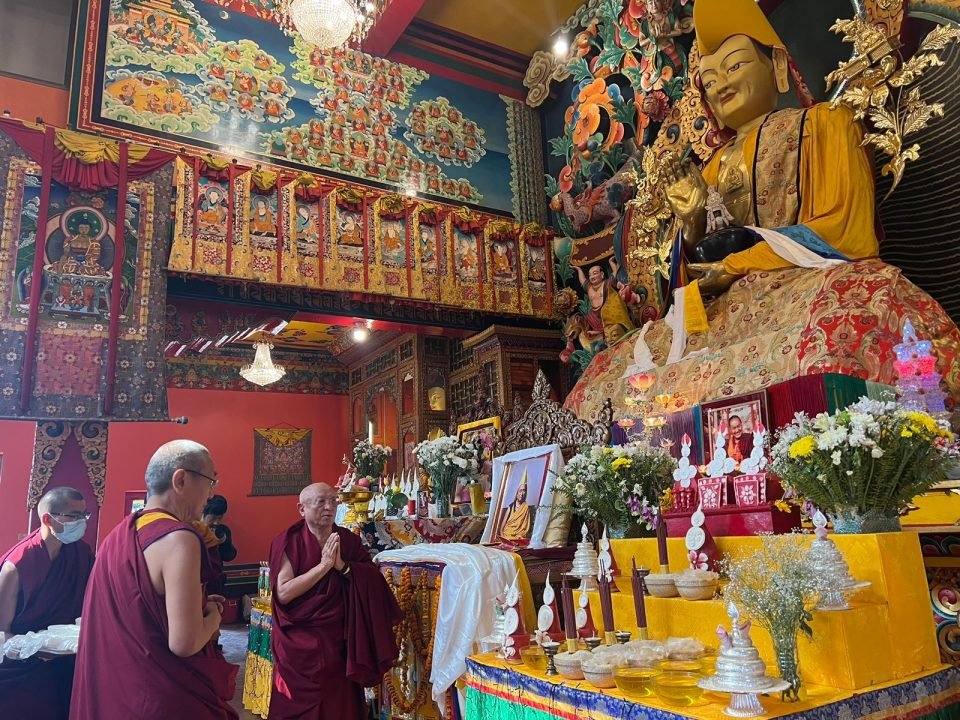
Khenrinpoche Thubten Chonyi and Chokyi Nyima Rinpoche at Kopan Monastery amidst the continual offering of prayers for Lama Zopa Rinpoche’s swift return. April 18, 2023. Photo by Kopan Monastery School.
Continued Prayers for Lama Zopa Rinpoche’s Swift Return
Prayers and pujas are continuing twenty-four hours a day at Kopan Monastery in front of Rinpoche’s holy body and also in the gompa for Lama Zopa Rinpoche’s swift return. Monasteries, nunneries and FPMT centers around the world also continue with prayers and pujas.
“Every inch of Kopan is in prayers around the clock,” as reported from the monastery. We are pleased to continue to share the livestream of prayers happening (with occasional breaks). You will find it to be much better quality than the stream we offered initially, and all are invited to connect with what is being done at Kopan in this way: https://www.youtube.com/c/fpmtinc/live
Chokyi Nyima Rinpoche, a Nyingma lama very close to Lama Zopa Rinpoche, visited Kopan this morning, joining the prayers in Rinpoche’s room. You can read Chokyi Nyima’s heartfelt letter written upon receiving the news of Rinpoche’s passing. We are happy to share this short video of the prayers happening today, joined by Chokyi Nyima Rinpoche:
https://youtube.com/shorts/J0eBjsY3j2g?feature=share
Tenzin Osel Hita is at Kopan and spoke to students gathered today. Ganden Tri Rinpoche, head of the Gelug school of Tibetan Buddhism, arrived at Kopan today.
This is the current schedule of daily prayers and pujas being offered and livestreamed, according to the local time in Nepal:
- 5:00 a.m. to 9:00 a.m. Dung Choe practice by senior Sangha
- 9:00 a.m. to 4:00 p.m. Yamantaka Solitary Hero Self-Initiation
- 4:30 p.m. to 6:30 p.m. various practices (Lamrim Meditation, Tendrel Toepa (In Praise of Dependent Origination), Calling Guru from Afar, Prayers for the Swift Return of Lama Zopa Rinpoche by international students)
- 7:30 p.m. to 1:00 a.m. Vajrayogini Self-Initiation
- 1:00 a.m. to 5:00 a.m. Guru Puja, Tendrel Toepa (In Praise of Dependent Origination), Manjushri-nama-samgiti (Chanting the Names of Manjushri), King of Prayers, Abhisamayalamkara (Ornament of Clear Realizations), Mulamadhyamakakarika (Root Verses on the Middle Way), Prayers for the Swift Return of Lama Zopa Rinpoche by monks and nuns.
Every seventh day there will also be Heruka Lama Chopa with Tsog at Kopan Monastery. Those dates are: April 19 and 26; May 3, 10, 17, and 24; and May 31.
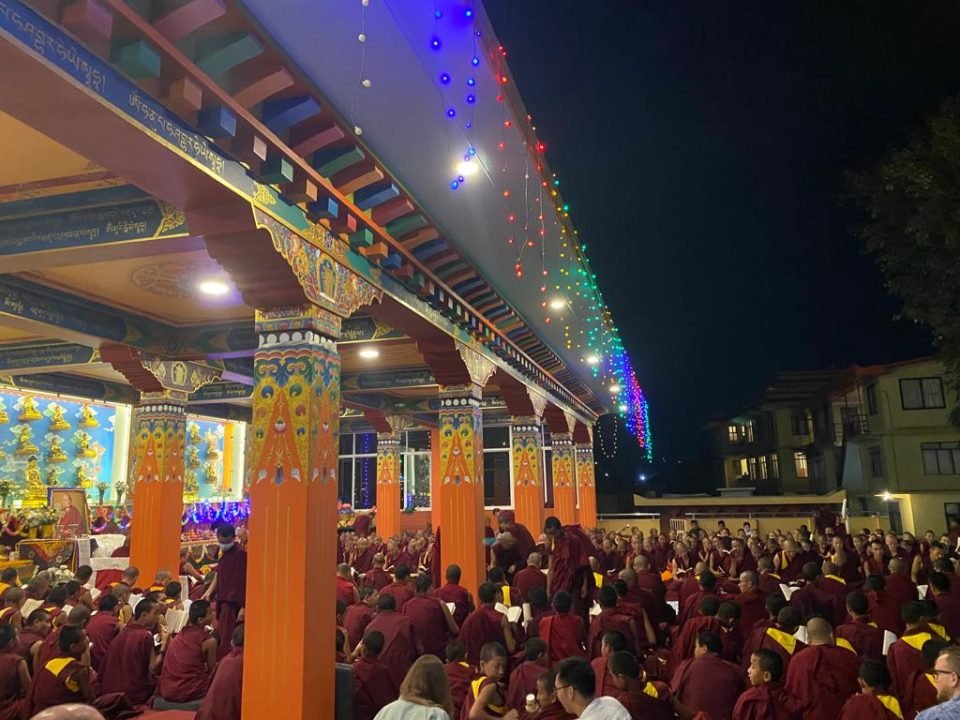
Prayers around the clock continue at Kopan Monastery for Lama Zopa Rinpoche’s swift return. Photo by Alison Murdoch.
Important Events
On the forty-ninth day after Rinpoche stopped breathing, which is May 31, Heruka Lama Chopa with Tsog will be offered at Kopan Monastery.
Before that, we have the very significant long life puja offered to His Holiness the Dalai Lama on May 24 in India. We’re hoping that many will come to this long life puja (or watch it livestreamed), as this puja will be exceptionally poignant and significant as it is a fulfilment of Rinpoche’s holy wishes.
On Khenrinpoche Geshe Chonyi’s advice, we’re planning to amend the already scheduled Light of the Path Retreat at Kopan (currently scheduled for September 3-17, 2023), and make it a month to come together for focused study and celebration of Rinpoche’s teachings, giving the opportunity to go deeper into and actualize the teachings Rinpoche has so kindly given us. We have such a wealth of teachings from Rinpoche, this will be a special opportunity to actualize them together. There will be senior FPMT registered teachers leading meditations and Khenrinpoche, Ven. Roger Kunsang, and others sharing life stories. It is likely that students will be able to come for any period of time within the Light of the Path month, depending on available accommodation at Kopan.
Details on this Light of the Path Retreat are still being worked out, but we wanted to offer these updates now so that you can have all this in mind for planning what you would be able and most like to join.
(Please note: This means that the Foundation Service Seminar that was scheduled at Kopan in September will be postponed).
Advice for FPMT Centers and Students
The following practices are suggested by Khenrinpoche Geshe Chonyi for FPMT centers and students to do at this time. These are practices to be offered as one wishes, not everything here has to be done:
- Lama Chopa and Tsog Offering – every day, or every seventh day
- Eight Verses of Thought Transformation
- In Praise of Dependent Origination translation by Thubten Jinpa | translation by Gavin Kilty
- Chanting the Names of Noble Manjushri
- King of Prayers
- Prayers for the Swift Return of Lama Zopa Rinpoche by His Holiness the 14th Dalai Lama, Tenzin Gyatso, and other distinguished lamas
Swift Return Booklet
We are delighted that so many centers and students have made quick use of the booklet containing swift return prayers for Lama Zopa Rinpoche from His Holiness the Dalai Lama, Khandro Kunga Bhuma, and others. We have made a recent update to this booklet and all are encouraged to download this most recent version: A Prayer for the Swift Return of Lama Zopa Rinpoche by His Holiness the Dalai Lama with additional prayers by other distinguished lamas
We have also added various translations as well as the standalone of His Holiness’s swift return prayer; and we are adding translations of the other prayers in the booklet as standalones as they become available.
(Please note: This collection of swift return prayers is a work in progress and updated versions of the booklet will be released. Our aim has been to make these prayers accessible as soon as they are available. Further prayers may be added to subsequent editions of the collection and edits made to existing prayers.)
News, Updates, Resources, Tributes
As a reminder, we have created the Updates Regarding Lama Zopa Rinpoche page, where all news and updates we have shared are and will be collected. On that page we’ve also added a link to translations to updates available, with our thanks to the translation services.
We have also made available a page sharing tributes and condolences from great lamas, friends, and monastery officials around the world.
From our Tributes and Condolences page we have recently added a link to an online student tribute page created by Amitabha Buddhist Centre, Singapore, for students to add their messages, tributes, and memories about Lama Zopa Rinpoche. We will share links to other online remembrance pages from FPMT centers as we receive them.
Please continue trying to fulfil Rinpoche’s holy wishes, especially to practice impermanence and bodhicitta in the context of the lamrim. Fulfilling the gurus’ holy wishes is a very important part of inviting the guru to return.
May Rinpoche be reborn as quickly as possible in a place where he can be very quickly recognized and be of most benefit to sentient beings.
Big love,
Your friends at FPMT International Office
We will continue to send out updates as they become available, and these will be collected on this updates page.
Foundation for the Preservation of Mahayana Tradition (FPMT), is a Tibetan Buddhist organization dedicated to the transmission of the Mahayana Buddhist tradition and values worldwide through teaching, meditation and community service.
16
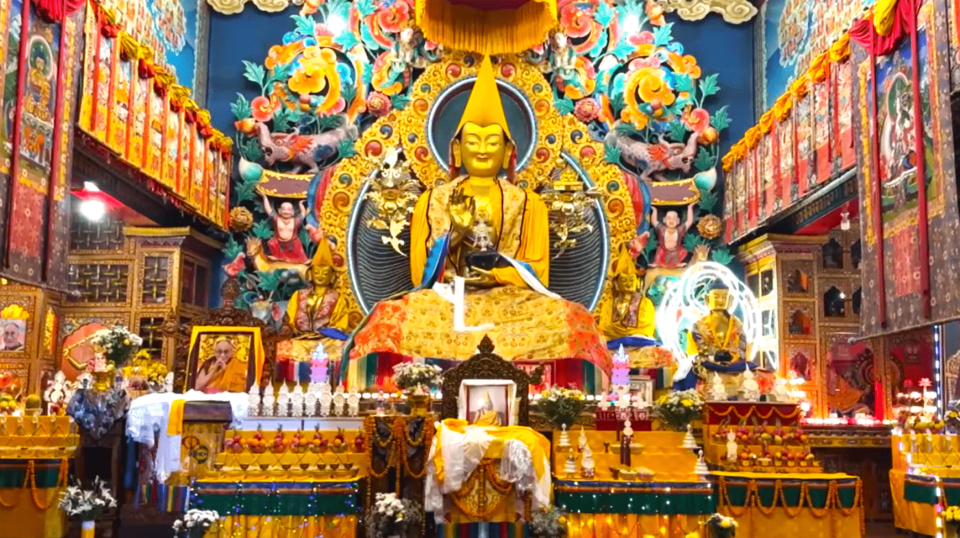
The main gompa at Kopan Monastery, April 15, 2023.
Today we share some important updates and newly available resources. Thank you for your continued prayers, offerings of support, condolences, and kindness.
The Embalming Process
The embalming process for Lama Zopa Rinpoche’s holy body has begun. We have a short video to share of the prayers taking place around Rinpoche’s holy body at the start of the embalming process.
Regarding the lamas helping to take care of the embalming of Rinpoche’s holy body, the “Nyingma lama” we referred to in yesterday’s update is one of Rinpoche’s teachers, Lama Ngawang Chokyung. We are exceptionally grateful for his guidance. Lama Ngawang Chokyung is very experienced in this method, and supervised the embalming of His Holiness Trulshik Rinpoche. The “ex-abbot of Gyumed” that we referred to is the present abbot of Segyü Dratsang, Khen Rinpoche Losang Wangdu. We are very grateful for all his care and assistance at this time.
Swift Return Prayer by His Holiness the Dalai Lama
With great rejoicing we have received a prayer which His Holiness the Dalai Lama composed for the swift return of Lama Zopa Rinpoche. This is available in English and Tibetan and has a particularly poignant colophon. For the convenience of students, we have compiled His Holiness’s prayer (starting on page 5), along with a small collection of additional prayers for Rinpoche’s swift return, composed spontaneously by other distinguished lamas with whom Rinpoche had a connection in this lifetime. It will be updated as we receive new compositions. Please download Prayer for the Swift Return of Lama Zopa Rinpoche by His Holiness the Dalai Lama with additional prayers by other distinguished lamas. This booklet is very user friendly with each prayer bookmarked and linked to from the contents page.
Prayers Offered, April 16
The following prayers are being offered today, April 16, at Kopan Monastery:
- Vajrasattva bath offering
- Thirteen Deities Yamantaka self-initiation offered by Rinpoches, Khenrinpoche, Gyumed senior monks and Kopan lama gyupas
- Extensive Medicine Buddha puja offered by general assembly of monks and nuns
- Bodhicharyavarara recitations offered by senior nuns
- All Kopan monks and nuns together with all monks of the Gelug monasteries in Nepal are gathering in the afternoon to recite prayers
- Lay devotees come in various group to make offerings and prayers
- All monks and nuns together with international students are reciting Madyamulakarika in the evening
- More pujas will continue all night
You can watch a livestream of the continued prayers and pujas at Kopan.
Tributes and Condolences
We have received many tributes to Lama Zopa Rinpoche, and messages of support and condolence, including some prayers and practices offered for Rinpoche’s swift return, from lamas and monasteries around the world. You can read these on our new Tributes and Condolences page, which we’ve added to our Updates Regarding Lama Zopa Rinpoche page.
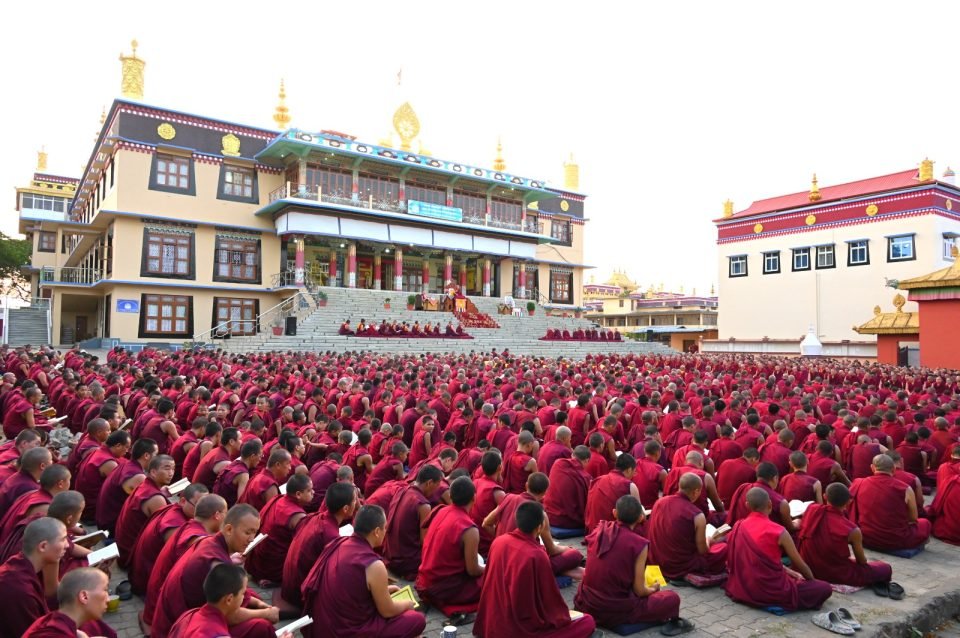
The monks of Sera Je Monastery gathering to offer prayers for the swift return of Lama Zopa Rinpoche. Photo courtesy of Sera Je Monastery.
Ongoing Practice and Dedication
Please continue trying to fulfil Rinpoche’s holy wishes, especially to practice impermanence and bodhicitta in the context of the lamrim. Fulfilling the gurus’ holy wishes is a very important part of inviting the guru to return.
May Rinpoche be reborn as quickly as possible in a place where he can be very quickly recognized and be of most benefit to sentient beings.
Big love,
Your friends at FPMT International Office
We will continue to send out updates as they become available, and these will be collected on this updates page.
Foundation for the Preservation of Mahayana Tradition (FPMT), is a Tibetan Buddhist organization dedicated to the transmission of the Mahayana Buddhist tradition and values worldwide through teaching, meditation and community service.
- Tagged: embalming process, his holiness the dalai lama, khen rinpoche losang wangdu, kopan monastery, lama ngawang chokyung, lama zopa rinpoche updates, sera je monastery, swift return prayers
15
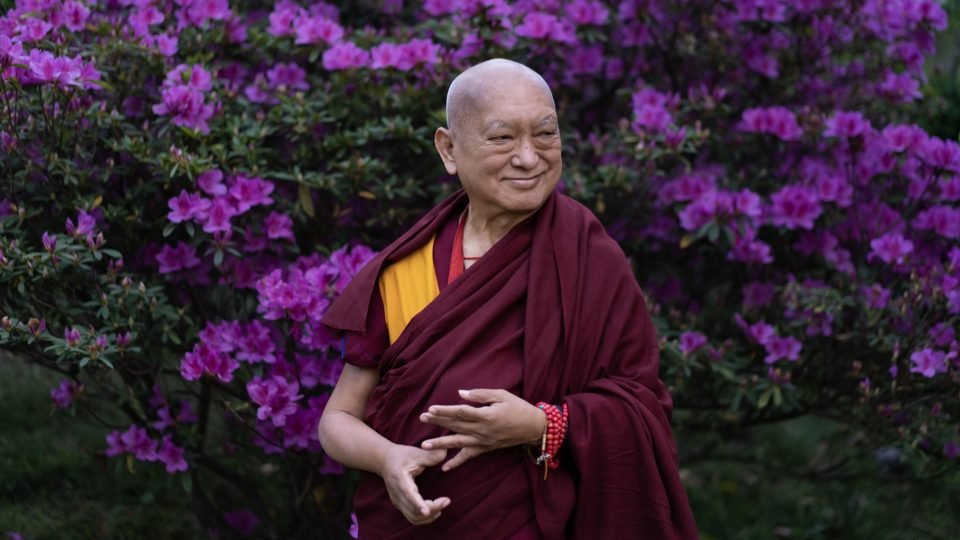
Lama Zopa Rinpoche in Nepal, March 27, 2023. Photo by Ven. Lobsang Sherab.
On April 14 at 10 p.m. Nepal time, blood came from Rinpoche’s left nostril, signaling that Rinpoche had ended his meditation.
The room was then made cold to maintain the holy body, and this morning the holy body was packed in ice.
The embalming process is the next step.
Khandro Kunga Bhuma has advised that today (April 15) is a dakini day, and that 7: 30 p.m. Nepal time today is the special time of the dakini day that fits for Rinpoche’s holy body to begin the embalming process. Khandro Kunga Bhuma will continue to take care – she is now in Nepal.
Two lamas are there who will be in charge of the embalming process, which may take several months. They are Geshe Wangdu, ex-Gyumed abbot; and a Nyingma lama (from whom Lama Zopa Rinpoche had taken transmissions), and who looked after the embalming of Trulshik Rinpoche. Ven. Roger will keep us informed about the process and timeline and we will continue to share updates on this process.
His Excellency Ling Rinpoche suggested that Rinpoche’s holy body be embalmed (rather than cremated) because Lama Zopa Rinpoche has so many students and is so widely known, as then people can come and pay their respects to Rinpoche’s holy body—it will become an object of pilgrimage at Kopan. As previously mentioned, Ven. Roger requested His Holiness the Dalai Lama to comment on this suggestion, and His Holiness advised that this is a very good way forward.
Pujas continue to go on constantly everywhere at Kopan: everyone in the monastery and nunnery is participating. The livestream of the prayers by Rinpoche’s room is continuing.
Additionally, groups are coming from other monasteries to do their own prayers in the gompa at Kopan in their own way for Rinpoche. We are making offerings to them.
Many, many monasteries are also doing pujas and prayers for Rinpoche in their own gompas. We will make offerings to them also.
Please continue trying to fulfil Rinpoche’s holy wishes, especially to practice impermanence and bodhicitta in the context of the lamrim. Fulfilling the gurus’ holy wishes is a very important part of inviting the guru to return.
We are delighted to share that we just received the swift return prayer composed by His Holiness the Dalai Lama, in Tibetan, which is downloadable from the Updates Regarding Lama Zopa Rinpoche page. We will make it available in English as soon as possible.
We are also very happy to share the swift return prayer composed by Khandro Kunga Bhuma, in Tibetan and with a quick translation into English, also now downloadable from the Updates Regarding Lama Zopa Rinpoche page.
We rejoice in the swift return prayers kindly composed by other lamas also. We will add them to the Updates Regarding Lama Zopa Rinpoche page as soon as possible.
May Rinpoche be reborn as quickly as possible in a place where he can be very quickly recognized and be of most benefit to sentient beings.
Big love,
Your friends at FPMT International Office
We will continue to send out updates as they become available, and these will be collected on this update page.
Foundation for the Preservation of Mahayana Tradition (FPMT), is a Tibetan Buddhist organization dedicated to the transmission of the Mahayana Buddhist tradition and values worldwide through teaching, meditation and community service.
- Tagged: embalming process, kopan monastery, lama zopa rinpoche final meditation, lama zopa rinpoche updates, swift return prayers
14
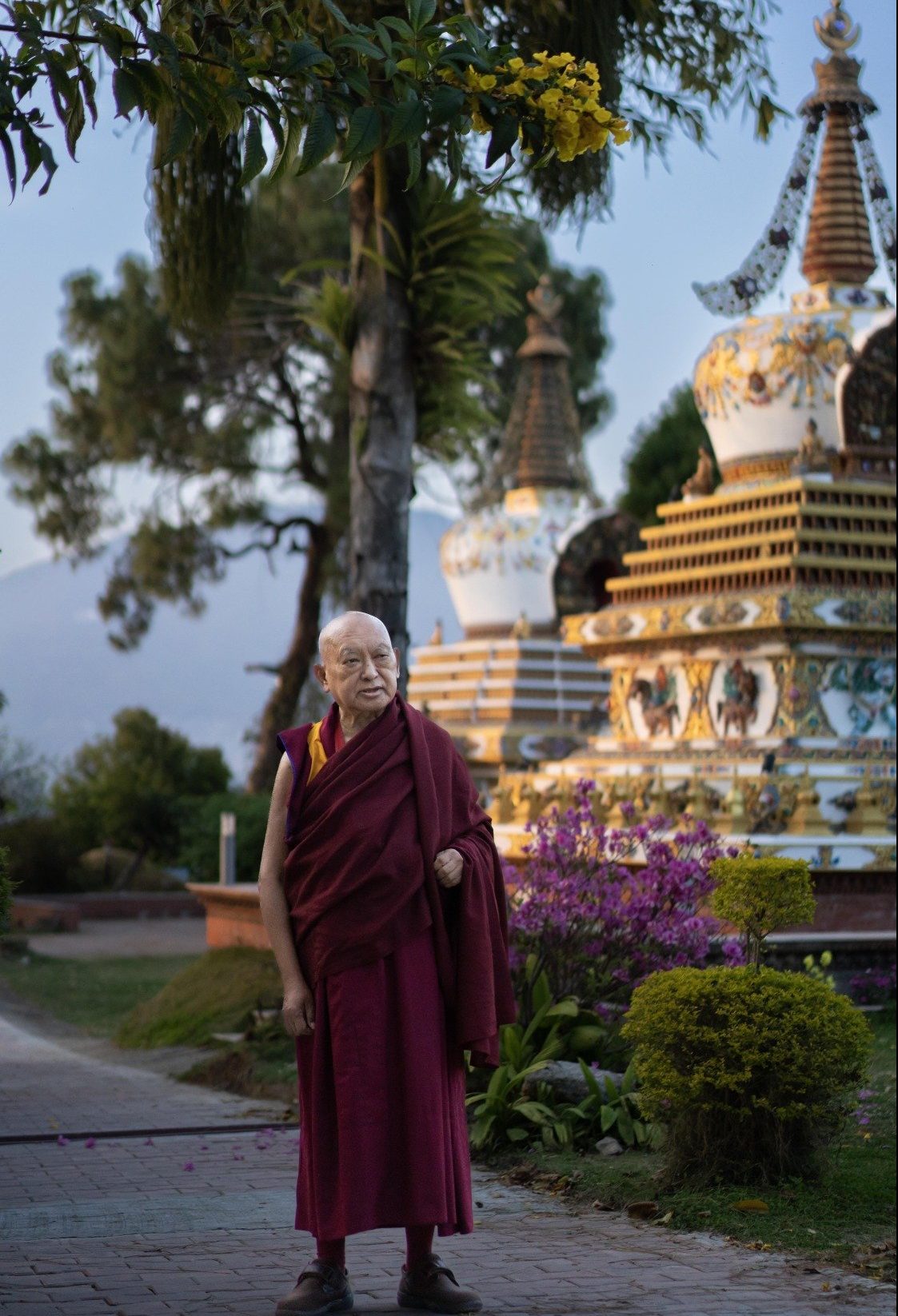
Lama Zopa Rinpoche at Kopan Monastery, March 25, 2023. Photo by Ven. Lobsang Sherab
Yesterday we shared the incredibly heart breaking news that on April 13th, Lama Zopa Rinpoche showed the aspect of passing away.
Lama Zopa Rinpoche is still in the meditation stage in his room in Kopan Monastery. A short video of Rinpoche in clear light meditation is available on Youtube if you would like to view our precious guru at this time.
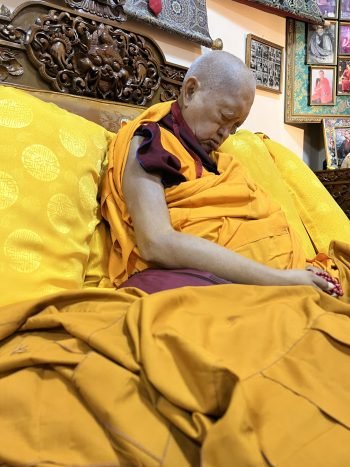
Lama Zopa Rinpoche in clear light meditation, Kopan Monastery, April 13, 2023. Photo by Ven. Roger Kunsang.
In the room next to the room where Lama Zopa Rinpoche’s holy body sits in meditation, Kopan monks immediately started and are continuously engaged in twenty-four hour prayers, pujas and self-initiations, and in Kopan’s main gompa prayers are being offered continually. The ongoing prayers with the monks and nuns are being livestreamed and you can connect with that now on Youtube.
His Holiness the Dalai Lama advised on the prayers and practices to be done in Kopan, and also immediately accepted to compose a swift return prayer for Rinpoche’s students.
Lelung Tulku is at Kopan and offering special prayers and puja, and Khandro Kunga Bhuma will arrive tomorrow.
The Kopan monks twenty-four hour prayers, pujas, and self-initiations have thus far included Yamantaka self-initiation, The Eight Prayers (many times), Lama Chopa (several times), recitations of Manjushri’s root text and Drang Nge Lekshe Nyingpo, and many Tara prayers.
This morning, April 14, the Kopan nuns took over and began an all day Vajrayogini self-initiation, which is done extensively. In the evening the monks will perform Guhyasamaja self-initiation, which will continue all night.
On April 15, a number of Gyudme tantric monks arrive and will be joined by Kopan monks to do extensive Five-deity Heruka Body Mandala self-initiation. This will continue every day, twenty-four hours a day, for many days.
Following advice from His Eminence Ling Rinpoche, and confirmed by His Holiness the Dalai Lama, Lama Zopa Rinpoche’s body will not be cremated, but will be embalmed. Khandro Kunga Bhuma will help to take care of this process.
We will announce information regarding the main prayer ceremony for Rinpoche once the time comes and we have specific details to share.
Khandro-la very clearly said that Rinpoche took on the obstacles for His Holiness the Dalai Lama, and maybe other lamas also, but definitely Rinpoche took on obstacles of His Holiness.
Rinpoche continues in clear light meditation, which gives us a very special opportunity to connect with Rinpoche’s holy mind.
Please keep trying to fulfil Rinpoche’s holy wishes, especially to practice impermanence and bodhicitta in the context of the lamrim. Fulfilling the gurus’ holy wishes is a very important part of inviting the guru to return.
We will continue to send out updates as they become available, and these will be collected on this update page.
Foundation for the Preservation of Mahayana Tradition (FPMT), is a Tibetan Buddhist organization dedicated to the transmission of the Mahayana Buddhist tradition and values worldwide through teaching, meditation and community service.
13
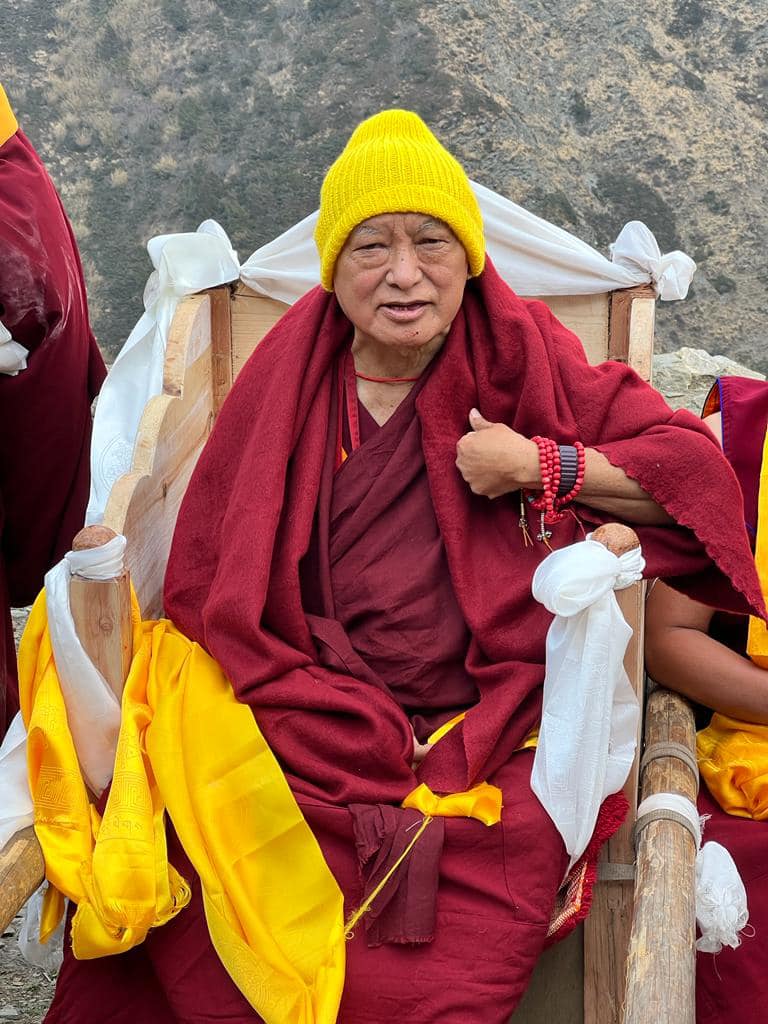
Lama Zopa Rinpoche arriving at Tsum Valley, Nepal, April 10, 2023. Photo by Ven. Roger Kunsang.
Our precious guru is sitting in meditation at Kopan Monastery.
Rinpoche had been up in the mountains in the Tsum Valley since Monday, and had to be brought down urgently as Rinpoche was experiencing altitude sickness.
On arrival back in Kathmandu this morning, Rinpoche stopped breathing. The main doctor at Karuna Hospital tried for some time to revive Rinpoche, but that was not successful. Rinpoche entered meditation at about 9.30am Nepal time, today Thursday April 13th.
His Holiness has been informed, and is giving advice.
The lama gyupas and monks are taking turns in sessions offering Cittamani Tara with Rinpoche, as advised by His Holiness. Other pujas and prayers are being offered here in Kopan.
Khadro-la has advised that this is a most important and precious time for students. Khadro-la went on to advise that the best thing for the students to do at this time is to practice bodhicitta in particular, as well as impermanence in the context of the lamrim, and then also as much as one can to help fulfil the guru’s holy wishes.
Khadro-la insisted that we should take this opportunity to try to achieve all or some of the lamrim in our own practice. Meditating and praying to the guru to receive his blessings and guidance is very important. And to try as much as possible to complete Rinpoche’s projects and holy wishes, so already to generate that wish that we’ll be able to do that.
Please pray and dedicate for Rinpoche to be reborn as quickly as possible in a place where he can be very quickly recognized and be of most benefit to sentient beings.
Please keep trying to fulfill Rinpoche’s holy wishes, especially to practice impermanence and bodhicitta in the context of the lamrim. Fulfilling the gurus’ holy wishes is a very important part of inviting the guru to return.
As you know, Rinpoche was the embodiment of bodhicitta, and always stressed the importance of remembering impermanence, and the essential need to put the teachings into practice. This is what we can do for our precious guru now – please try to follow Rinpoche’s heart advice. We can all connect with the guru and receive the guru’s blessings in this way – NOW is a very important time for this.
Our hearts are breaking, we take all our support from Rinpoche’s teachings, and the guidance of His Holiness and our teachers, and in our FPMT family.
Big love
On behalf of Ven Roger Kunsang
FPMT International Office
We will send out updates as they become available.
Foundation for the Preservation of Mahayana Tradition (FPMT), is Tibetan Buddhist organization dedicated to the transmission of the Mahayana Buddhist tradition and values worldwide through teaching, meditation and community service.
- Tagged: kopan monastery, lama zopa rinpoche final meditation, lama zopa rinpoche tsum, lama zopa rinpoche updates
3
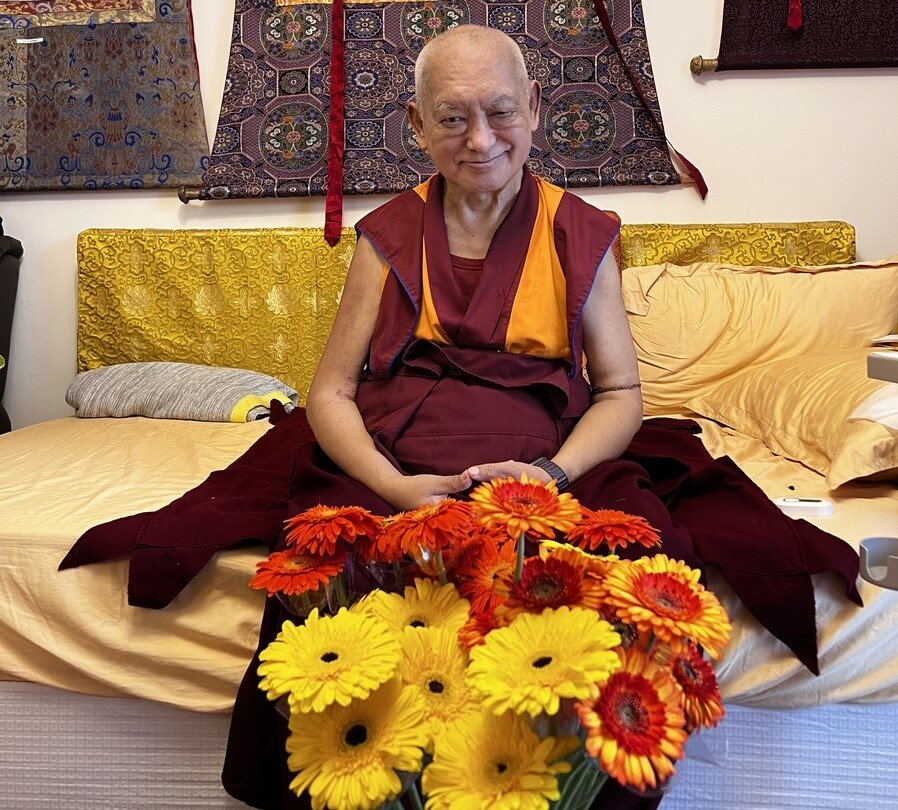
Lama Zopa Rinpoche with flower offering at Amitabha Buddhist Centre, Singapore, August 2022. Photo by Ven. Roger Kunsang.
Lama Zopa Rinpoche will be teaching and giving an initiation in Singapore and Malaysia this year in June, July, and August! Dates are on Rinpoche’s Schedule.
At Amitabha Buddhist Centre, Singapore, Rinpoche will be continuing the Lama Chopa commentary begun some years ago. Please note: the Lama Chopa commentary is restricted to qualified persons and requires prior registration
In Losang Dragpa Centre, Kuala Lumpur, Malaysia, Lama Zopa Rinpoche will give lamrim teachings, and will kindly bestow the highest yoga tantra initiation of Yamantaka. Please note that this initiation is restricted to qualified persons and requires prior registration.
For further details, or to register for the program, please contact each center directly.
For more information about the ABC event in Singapore: https://fpmtabc.org/2023/event/lzr2023.php
For more information about the LDC event in Malaysia: https://fpmt-ldc.org/lama-zopa-in-malaysia
Lama Zopa Rinpoche is the spiritual director of the Foundation for the Preservation of Mahayana Tradition (FPMT), a Tibetan Buddhist organization dedicated to the transmission of the Mahayana Buddhist tradition and values worldwide through teaching, meditation and community service.
- Tagged: lama zopa rinpoche schedule, malaysia, mani retreat, singapore
31
We recently shared news about Wisdom Publications’ release of The Swift Path: A Meditation Manual on the Stages of the Path to Enlightenment by Panchen Losang Yeshe and translated by Szegee Toh into English. This book is the third title in the Wisdom Culture Series published by Wisdom Publications in association with FPMT.
This book contains a wonderful foreword by Lama Zopa Rinpoche, and we are sharing it here in its entirety. We hope this foreword will inspire you to read this extraordinary meditation manual in its entirety.
Foreword to The Swift Path: A Meditation Manual on the Stages of the Path to Enlightenment
By Lama Zopa Rinpoche
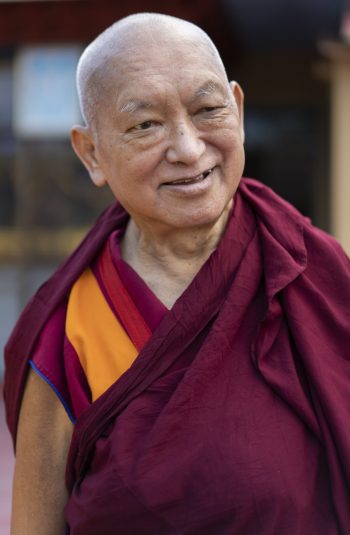
Lama Zopa Rinpoche at Kopan Monastery, Nepal, May 2022. Photo by Ven. Lobsang Sherab.
What is the importance of this text, the Swift Path by Paṇchen Losang Yeshe? To talk straight, millions and millions of people have depression. Why is that? I believe that the fundamental reason is because they lack an understanding of the meaning of life. In most cases, they haven’t met the Dharma, the path to enlightenment, so they don’t know the happiness that comes from practicing it. There are also people who have met the graduated path to enlightenment, the lamrim, but because they do not really practice it, the lamrim remains on paper; it does not go into their heart. And when, due to past karma, a problem involving an attachment to the happiness of this life arises, say their wife leaves them for someone else, they cannot bear it. They may even have an intellectual understanding of the lamrim, but without having really practiced it in their heart, they cannot renounce their attachment to their wife when she leaves them, or they become consumed by distress when someone important to them dies. It feels like they are the only person in the world experiencing that kind of suffering; with attachment, it can feel like that. In this state, they are vulnerable because of their past karma, their past harmful actions, and some people may even kill themselves in their extreme state.
Suicides even happened among the residents of the refugee camp in Buxa Duar, India, where, after escaping from Tibet, I lived for eight years and studied a little bit of philosophy. During that time, there was a monk who was a puja leader. After an influential person who had helped Tibet passed away, the Tibetans in general and the monks in particular were very upset. It was perhaps after that that he took his own life at a place on the way to Pasangkar, where I went many times along with some other monks to get injections for tuberculosis. On a mountain where there had been a landslide, the puja leader hanged himself. His body was found hanging from a high branch with a rope around his neck.
Likewise, when America was fighting in Iraq, every minute of the soldiers’ lives was uncertain. They saw many acts of violence. Because of this, when the soldiers who survived returned home to see their families, their minds were totally disturbed. They couldn’t see any meaning in life. I met one of these American soldiers at my retreat cave in Lawudo, Nepal. He was a very intelligent, highly trained soldier who found out about Lawudo on the internet, and he happened to be in Lawudo while I was there. I called him to come to my cave so that I could ask him some questions. He was someone who didn’t talk much, but he told me that the American government introduced the returned soldiers to mindfulness, which comes from Buddhism, because it makes the mind peaceful. I think the idea behind it was that by not thinking about the past and future, and by keeping the mind still, people feel a little bit better.
When people don’t know the meaning of life, and don’t know the happiness that comes from practicing the Dharma, they then experience unbelievable problems and unhappiness; they become chronically depressed, unable to recover. I heard once about a man in England who had been sick with depression for twenty-five years. He had been to see many doctors, but nothing helped. However, one day, when he was working in a vegetable garden, he tried to think that he was doing it for others. By this intention to use his life to benefit others, to work for others, to serve others, he was able to change his mind, and only then did his depression go away. Like “An apple a day keeps the doctor away,” “A thought to benefit others a day keeps depression away.”
What sort of Dharma should you practice? Phabongkha Dechen Nyingpo’s Liberation in the Palm of Your Hand says:
The Dharma you practice should be the sublime Mahayana, which leads fortunate capable beings to buddhahood. It should be the tradition of the two great charioteers, Nagarjuna and Asanga. It should be the profound instruction drawing out the essence of the thought of the glorious, unequaled Lama Atisha and the great Lama Tsongkhapa, the Dharma king of the three realms. It should set out all the vital points of the essence of the 84,000 teachings, without anything missing, as stages of practice for one person to achieve enlightenment.
Therefore, you should first make sure that the Dharma that you are going to study and practice is the main path traveled by all the buddhas of the three times—past, present, and future. The very heart of the 84,000 teachings taught by the Buddha, when condensed, is the holy Dharma that is the lamrim, the graduated path, which includes both the profound and vast stages. The five great treatises (on Prajnaparamita, Madhyamaka, Abhidharma, Pramaṇa, and Vinaya) that form the core curriculum of Gelug monasteries are elaborations of this holy Dharma. If you follow this path, like the buddhas of the three times, you will also be able to achieve buddhahood, the total cessation of obscurations and the completion of realizations.
If, instead, you follow a path that the holy beings of the past did not practice, you risk reaching a very strange place. You might experience the sufferings of the lower realms and the general sufferings of saṃsara for eons, with no chance for enlightenment. Therefore, before you rush to devour the Dharma that you intend to practice, like a dog rushes to food, you should thoroughly examine it. For, as Jamgon Sakya Paṇḍita said:
However much this life goes wrong,
there is neither harm nor benefit to your next life.
But if you meet a wrong Dharma,
all your future lives will go wrong.
If something else in your life goes wrong, even if you die and your consciousness is separated from your body, your consciousness will not necessarily go to the lower realms, where you would suffer for eons and eons; you might still go to a pure land or take a higher rebirth. But if you meet and practice a wrong Dharma and follow a wrong path, this could destroy your future lives for eons upon eons because of the negative imprints and habits it creates. You would not meet the Dharma and would not meet a virtuous friend for many lifetimes; you would instead experience great suffering. Do not be like many who, in my experience, practice whatever sounds good and makes them happy right now, never examining the nature of the teachings they are going to practice and where those teachings will lead them.
The instructions that you follow should be complete, with nothing missing, and unmistaken, and you should also be able to endure hardships to practice them. Otherwise, your effort will be mostly useless, in that you will not gain realizations, such as renunciation of the attachment to this life, and you will be unable to achieve enlightenment. As Milarepa said:
Without meditating on the meaning of the instructions of the oral lineage,
even if you cling to a retreat place, you will only torture yourself.
Milarepa was a lay person who achieved enlightenment in his lifetime during these degenerate times. After his father died, his aunt and uncle mistreated his family, causing his mother to advise Milarepa to learn black magic. He did so, and later, when the aunt and uncle were hosting a wedding at their house, Milarepa caused rocks from the mountain to crash down upon the house, utterly destroying it. The wedding guests upstairs and the animals downstairs were all killed.
Seeing what he had done, Milarepa felt great sadness and went to see his black magic teacher, who suggested that if he wanted to practice the Dharma, he should go to Lama Marpa. Upon finding him, Milarepa offered his body, speech, and mind. However, Marpa did not give him teachings for many years. Instead, he advised Milarepa to build a nine-story tower by himself (without any help from coolies!). After he built the tower, Marpa had him take it down and put all the stones back where he had found them, and this whole process was repeated two more times. After the third time, Marpa’s wife insisted that Marpa now give teachings to Milarepa. From Marpa’s side, he wanted Milarepa to bear hardships for even longer so that Milarepa would become enlightened much faster. But because his wife pushed him so much, Marpa, himself an enlightened being, manifested the maṇḍala of the deity and gave Milarepa initiation and teachings. Marpa then sent Milarepa to the mountains to do retreat. Bearing much hardship, Milarepa followed his guru’s instructions exactly, while subsisting on only nettles—without even any chili or salt! As a result, Milarepa became enlightened in that very life.
Just as the source of a river is traced back to a snow mountain, the source of the Dharma that you practice should trace back to Guru Shakyamuni Buddha, the founder of unmistaken teachings. Without an authentic source for the Dharma, even if you practice for a thousand years, you will not generate even one valid realization. It would be like wishing for butter by churning water. Thus the Dharma that you practice should have all three of these qualities: it should have been taught by the Buddha, the Omniscient One; it should have been examined well with quotations and logic and verified by the arya paṇḍitas of India; and it should have been actualized by yogis.
Many people in this world think that they are Buddhists when they don’t even have refuge in the Buddha, Dharma, and Sangha. The definition of a Buddhist is someone who has taken refuge from their heart by totally relying on the Buddha, Dharma, and Sangha, but these people don’t even recite a refuge prayer before they meditate. They don’t even have a statue of the Buddha in their house. When they meditate on emptiness, their meditation falls into either eternalism or nihilism, as it’s not the emptiness of the Middle Way. With nihilism, they think that nothing exists: there is no I, there is no action, there is no object, there is no saṃsara, there is no nirvaṇa.
One time when I was in Taiwan, I met a young man whose guru accepted only one disciple, who was him. He was trying hard to meditate, but his meditation on emptiness was contemplating that nothing exists. To tease him, I asked him, “Why do you go to the bathroom if nothing exists?” If nothing exists it means that there is no person who needs to urinate or defecate, no food or drink that was consumed, no urine or feces to expel, and no toilet in which to expel them. In the same way, there is no Buddha, Dharma, and Sangha. There is no Buddha to guide you to liberation from saṃsara. There is no Dharma to practice. There is no Sangha to help you practice. It all becomes very funny. You don’t exist and nor do your parents, brothers and sisters, husband, or wife. None of them exists.
In a sutra, the Buddha instructed Arya Katyayana, saying:
Katyayana, why do most people in this world strongly cling to existence or nonexistence—that is, to eternalism or nihilism? Clinging like that, they are not free from birth, old age, sickness, death, depression, lamenting, suffering, mental unhappiness, and fighting.
In short, they cannot completely abandon the root of the oceans of suffering of saṃsara, the ignorance that holds the I and the aggregates to be truly existent. They then cannot be liberated from saṃsara. For eons upon eons, they must experience countless sufferings in the lower realms.
Therefore, if you contemplate extensively, you will see that having an opportunity to listen to, reflect on, and meditate on the complete and unmistaken teachings, which are like refined gold, of Guru Shakyamuni Buddha, Nagarjuna, Candrakirti, and Lama Tsongkhapa is unbelievably fortunate. It is more precious than the whole sky filled with wish-granting jewels. For this reason, for your whole life—however many years, months, weeks, days, minutes, and seconds you have left to live—you should generate great happiness and rejoice in your good fortune. You are like a blind man who has found in the garbage a wish-granting jewel. If you do not meet the teachings of the graduated path to enlightenment, the heart of the whole entire Buddhadharma, which is like an ocean, you will never achieve liberation from saṃsara, and you will never achieve enlightenment. As it says in Phabongkha Dechen Nyingpo’s Opening the Door to the Excellent Path:
This is because with renunciation, every action you do with your body, speech, or mind becomes a cause of liberation; with bodhicitta, every action you do becomes a cause of enlightenment; and with right view, every action you do becomes a remedy to saṃsara. If your actions of body, speech, and mind are not conjoined with these three principal aspects of the path to enlightenment, even if you meditate on the cakras, winds, and drops; on mahamudra, the great seal; on dzokchen, the great completion; or on the generation and completion stages of tantra, they all become a cause of saṃsara. None of them becomes the slightest cause of liberation and enlightenment.
Kadampa Geshe Phuchungwa said to Kadampa Geshe Chen Ngawa, “Which would you choose? To be expert in the five great knowledges, achieve stable concentration, have the five clairvoyances, and achieve the eight siddhis? Or, on the other hand, to have a stable understanding of Lama Atisha’s instructions, such that no one can change your mind, even though you have not exactly actualized them in your heart?”
Kadampa Geshe Chen Ngawa answered, “Master, leaving aside generating the lamrim realizations in my heart, I would choose just facing toward the lamrim, wondering what it is. I have been expert in the five great knowledges, been able to concentrate for eons without distraction, had the five clairvoyances, and achieved the eight siddhis numberless times in the past, but I have not yet passed beyond saṃsāra. If I find definite understanding of Lama Atisha’s graduated path to enlightenment, I will definitely turn away from saṃsara.”
Phabongkha Dechen Nyingpo’s Liberation in the Palm of Your Hand says:
When you examine it, you will find there is no holy Dharma that is more sublime than this graduated path to enlightenment. Even the profound qualities of Secret Mantra Vajrayāna depend on the graduated path to enlightenment. Without generating the three principal aspects of the path to enlightenment in your mind, you cannot achieve enlightenment in one life by practicing the tantric path. I myself have indeed heard of many supposedly profound pure visions, Dharma treasures, and so forth from the past, but although there appear to be many wonderful collections of tantric activities and so forth, there do not seem to be any that are a way to bring forth experience of the three principal aspects of the path or that are an instruction that in essence has special qualities.
What is called the lamrim is not made up by Lama Tsongkhapa, Lama Atisha, and so forth. It has been transmitted from the fully enlightened Buddha alone. If you understand that, whether it has the name lamrim in the title or not, you will see that all the teachings of the Buddha are the lamrim.
And in relation to Tsongkhapa’s Great Treatise on the Stages of the Path to Enlightenment, Phabongkha Dechen Nyingpo explained:
Lama Tsongkhapa composed the requesting prayer [to the lineage gurus of the lamrim] Opening the Door to the Supreme Path at the base of a lion-like rockface at Radreng to the north [of Lhasa]. Whenever he invoked and made requests to an image of Lama Atisha with the holy head tilted to the side, he had a vision of all the gurus of the lamrim lineage discussing Dharma with each other. In particular, for a month Lama Tsongkhapa had visions of Lama Atisha and [the Kadampa geshés] Dromtönpa, Potowa, and Sharawa. In the end, the other three absorbed into Lama Atisha, who put his hand on Lama Tsongkhapa’s crown and said, “Work for the teachings of the Buddha, and I will help you.” That means Atisha was the one who persuaded Lama Tsongkhapa to write his Great Treatise on the Stages of the Path to Enlightenment. Lama Tsongkhapa then composed the Great Treatise up to and including the section on calm abiding. Later, having been persuaded by Manjushri he composed the section on great insight. Therefore, leaving aside other considerations, know that in dependence on those who persuaded Lama Tsongkhapa to write it, the Great Treatise is a treasury of blessings.
The meaning of the lamrim was elaborated on by Guru Shakyamuni Buddha, the paṇḍitas of India, and the great enlightened beings of Tibet, including Lama Tsongkhapa. Because the basis of the lamrim tradition is Lama Atisha’s Lamp for the Path to Enlightenment, in Liberation in the Palm of Your Hand Phabongkha Dechen Nyingpo set out the elaborate life story of Lama Atisha. After that, he continued by explaining that this teaching, the graduated path to enlightenment, has four great qualities and three special qualities, making it much more special than other teachings. The explanation that follows comes from Phabongkha Rinpoche.
The first great quality is that it allows you to realize that all the teachings of the Buddha are without contradiction. If taken literally, the Lesser Vehicle, the Great Vehicle, the Vinaya, and the Secret Mantra Vehicle may appear to contradict each other, but because they are all in reality only methods for one person to achieve enlightenment, they are without contradiction. It is like a sick person who goes to the doctor with a high fever. The doctor may give one set of advice initially, but later, when the symptoms change, may advise just the opposite. Although the two sets of advice do indeed appear to be contradictory, both are necessary for the one sick person to recover. Like this, all the subjects of the graduated path are practices for one person to achieve enlightenment.
The second great quality of the lamrim is that it allows every single teaching of the Buddha to appear as an instruction for practice. If you do not meet something like this graduated path to enlightenment, then some of the teachings of the Buddha and the commentaries on them will appear as practical while others will not. Moreover, regarding the gurus who revealed the instructions for practice in this world, there is none higher than Shakyamuni Buddha, and the highest instructions for practice are the supreme teachings of the Buddha. As Maitreya’s Sublime Continuum says:
Therefore, in the world, there is no one wiser than the Buddha.
Only the Omniscient One knows every single sublime reality just as it is; others do not.
Therefore, do not mess with whatever sūtras were laid out by the Sage himself,
because that would destroy the Buddha’s teachings and harm the holy Dharma.
So, if not all of the teachings of the Buddha and their commentaries appear to you as instructions for practice, it is because you have not understood the meaning of the graduated path to enlightenment. But by understanding the meaning of the graduated path, you will know that all the great scriptures, the Buddha’s teachings and the commentaries, are included in the lamrim, and that they are to be integrated into your practice.
The third great quality of the lamrim is that it allows you to easily discern the view of the Buddha. The Buddha’s teachings and their commentaries are sublime instructions for practice. Their subject matter is the ultimate view of the Buddha. However, without depending on the guru’s instructions, such as those on the graduated path to enlightenment, you will not find the ultimate view of the Buddha by depending on those great scriptures. Even if you are able to find it, it will take a long time and you will undergo extremely great hardships to do so. By depending on this lamrim, without any hardship you will easily find the view of the Buddha that is taught in those great scriptures.
If you ask what that view of the Buddha is, Dakpo Jampal Lhundrup (1845– 1919) said it should be taken in general to be the paths of beings of the three capabilities and, in particular, the three principal aspects of the path to enlightenment. That is definite. Lama Tsongkhapa clearly explained the view of the Prasangika Madhyamaka school as the ultimate view of the Buddha. In Three Principal Aspects of the Path, he said:
As long as these two understandings are seen as separate—
of appearance, unbetraying dependent relation,
and emptiness, the absence of all positions—
then you have not realized the Buddha’s intent.
This directly says that if you do not realize the right view, the Prasangika Madhyamaka view, you will not realize the view of the Buddha. It implies that if you do realize it, you will find the view of the Buddha. For example, the great scriptures are like an ocean. The view of the Buddha, such as the three principal aspects of the path to enlightenment, is like a jewel in that ocean. The lamrim is like a ship. The guru who reveals it is like a captain. Even though there are jewels in the ocean, if you enter it without depending on a ship, besides not obtaining any jewels, there is the danger that you will lose your life. Similarly, without depending on the lamrim, even if you study the great scriptures, it will be difficult for you to find the view of the Buddha. But if, by depending on a guru who is like a skilled captain, you board the ship of the lamrim, you will easily find the jewel that is the ultimate view of the Buddha in the great ocean of the extensive scriptures.
The fourth great quality of the lamrim is that it allows you to naturally cease the great vice of abandoning the Dharma. If you do not find definite understanding of the previous three great qualities, you will discriminate among the teachings of the Buddha, seeing some as higher and some as lower, some as philosophy and some as practices, and so forth, and then have greater or lesser devotion to them. By maintaining such discrimination, you continuously create the very heavy karma of abandoning the holy Dharma, for which the karmic obscurations are extremely heavy. In the Sutra Gathering All Fragments, the Buddha said:
Manjushri, the karmic obscurations of abandoning the holy Dharma easily happen. Manjushri discriminating some of the teachings taught by the Buddha as good and some as bad is abandoning the holy Dharma. Whoever abandons the holy Dharma criticizes the Tathagata. They talk badly about the Sangha. If you say, “This [teaching] is right” and “This is not right,” you abandon the holy Dharma. If you say, “This is taught for bodhisattvas” and “This is taught for hearers,” you abandon the holy Dharma. If you say, “This is taught for solitary realizers,” you abandon the holy Dharma. If you say, “This is not a training for bodhisattvas,” you abandon the holy Dharma.
As the King of Meditative Stabilizations Sutra says:
The negative karma of abandoning
the holy Dharma is far greater
than that of destroying all the holy objects
of offering in this Jambudvipa.
The negative karma of abandoning
the holy Dharma is far greater
than that of killing as many arhats
as there are sand grains in the Ganges.
By understanding the lamrim, you naturally stop committing the great vice of abandoning the holy Dharma.
This lamrim also has three special qualities. First, it is complete with nothing missing. The lamrim obviously cannot include all the words of the teachings of the Buddha and their commentaries, so when it says that nothing is missing, this means that all the vital points of the meaning are condensed and presented within it, leaving nothing out. That is why Lama Tsongkhapa explained in his Song of Spiritual Experience:
Each time you explain or listen to the lamrim,
the condensed essence of all the scriptures,
you collect the benefits of explaining and listening to the holy Dharma.
So, since it condenses the extensive teachings, contemplate its meaning.
The second special quality is that it is easy to practice. Each of us has experienced the various sufferings in this saṃsara, and each of us can achieve the everlasting happiness of liberation from saṃsara and of enlightenment. The creator of all these is the mind. And there is nothing better for subduing that mind than the lamrim. Since it was mainly taught as a method for subduing the mind, it is easy to put into practice.
Finally, the lamrim is more special than other traditions. Since the lamrim is adorned with the instructions of Guru Vidyakokila, learned in the tradition of Nagarjuna, and the instructions of Guru Serlingpa (Suvarṇadvipa), learned in the tradition of Asanga, it is a particularly precious tradition. As Lama Tsongkhapa also said in his Song of Spiritual Experience:
That which is well transmitted respectively from Nagarjuna and Asanga—
crown ornaments of the learned ones of the world,
banners of renown resplendent among beings—
is the graduated path to enlightenment.
Not even Maitreya’s Ornament for Clear Realizations or the king of tantras, the glorious Guhyasamaja, has these three special qualities. The entire subject matter of sūtra and tantra is not contained in either of these two, nor do they mainly explain the steps for subduing the mind.
Therefore, while you have this fortunate opportunity to study, reflect, and meditate on such a graduated path to enlightenment, which is extremely special in terms of its four great qualities and three special qualities, do not remain satisfied with a misguided and partial instruction for practice. It is extremely important that you engage with great effort in studying, reflecting, and meditating on this path. In short, no matter how busy you are, reading the lamrim regularly, even just a few pages a day, brings the mind directly into the graduated path to enlightenment and the three principal aspects of the path to enlightenment. Just imagine the benefit of doing that!
I am very pleased that this translation of the meditation instructions of Paṇchen Losang Yeshe is now available to English-speaking students of the Dharma. I have often recommended this text, including to my student Diana, who sponsored the excellent and careful translation here by Szegee. I rejoice in the merit of everyone involved in its creation and publication.
Thank you very much!
Lama Zopa Rinpoche
Kopan Monastery, Nepal
You can order the Swift Path from Wisdom Publications: https://wisdomexperience.org/product/the-swift-path/
- Tagged: panchen losang yeshe, Szegee Toh, the swift path
- Home
- News/Media
- Study & Practice
- About FPMT Education Services
- Latest News
- Programs
- New to Buddhism?
- Buddhist Mind Science: Activating Your Potential
- Heart Advice for Death and Dying
- Discovering Buddhism
- Living in the Path
- Exploring Buddhism
- FPMT Basic Program
- FPMT Masters Program
- FPMT In-Depth Meditation Training
- Maitripa College
- Lotsawa Rinchen Zangpo Translator Program
- Universal Education for Compassion & Wisdom
- Online Learning Center
- Prayers & Practice Materials
- Overview of Prayers & Practices
- Full Catalogue of Prayers & Practice Materials
- Explore Popular Topics
- Benefiting Animals
- Chenrezig Resources
- Death & Dying Resources
- Lama Chopa (Guru Puja)
- Lama Zopa Rinpoche: Compendium of Precious Instructions
- Lama Zopa Rinpoche: Life Practice Advice
- Lama Zopa Rinpoche Practice Series
- Lamrim Resources
- Mantras
- Prayer Book Updates
- Purification Practices
- Sutras
- Thought Transformation (Lojong)
- Audio Materials
- Dharma Dates – Tibetan Calendar
- Translation Services
- Publishing Services
- Teachings and Advice
- Find Teachings and Advice
- Lama Zopa Rinpoche Advice Page
- Lama Zopa Rinpoche: Compendium of Precious Instructions
- Lama Zopa Rinpoche Video Teachings
- ༧སྐྱབས་རྗེ་བཟོད་པ་རིན་པོ་ཆེ་མཆོག་ནས་སྩལ་བའི་བཀའ་སློབ་བརྙན་འཕྲིན།
- Podcasts
- Lama Yeshe Wisdom Archive
- Buddhism FAQ
- Dharma for Young People
- Resources on Holy Objects
- Ways to Offer Support
- Centers
- Teachers
- Projects
- Charitable Projects
- Make a Donation
- Applying for Grants
- News about Projects
- Other Projects within FPMT
- Support International Office
- Projects Photo Galleries
- Give Where Most Needed
- FPMT
- Shop
Translate*
*powered by Google TranslateTranslation of pages on fpmt.org is performed by Google Translate, a third party service which FPMT has no control over. The service provides automated computer translations that are only an approximation of the websites' original content. The translations should not be considered exact and only used as a rough guide.Basically, the human mind is mostly unconscious, ignorant, and gets so preoccupied with new experiences, that it forgets the old ones. Review the past month: exactly what happened, precisely what feelings did you have, every day? You can’t remember, can you? But if you practice this slowly, slowly, continuously checking within your mind, eventually, you’ll be able to remember more and more of your previous experiences.







